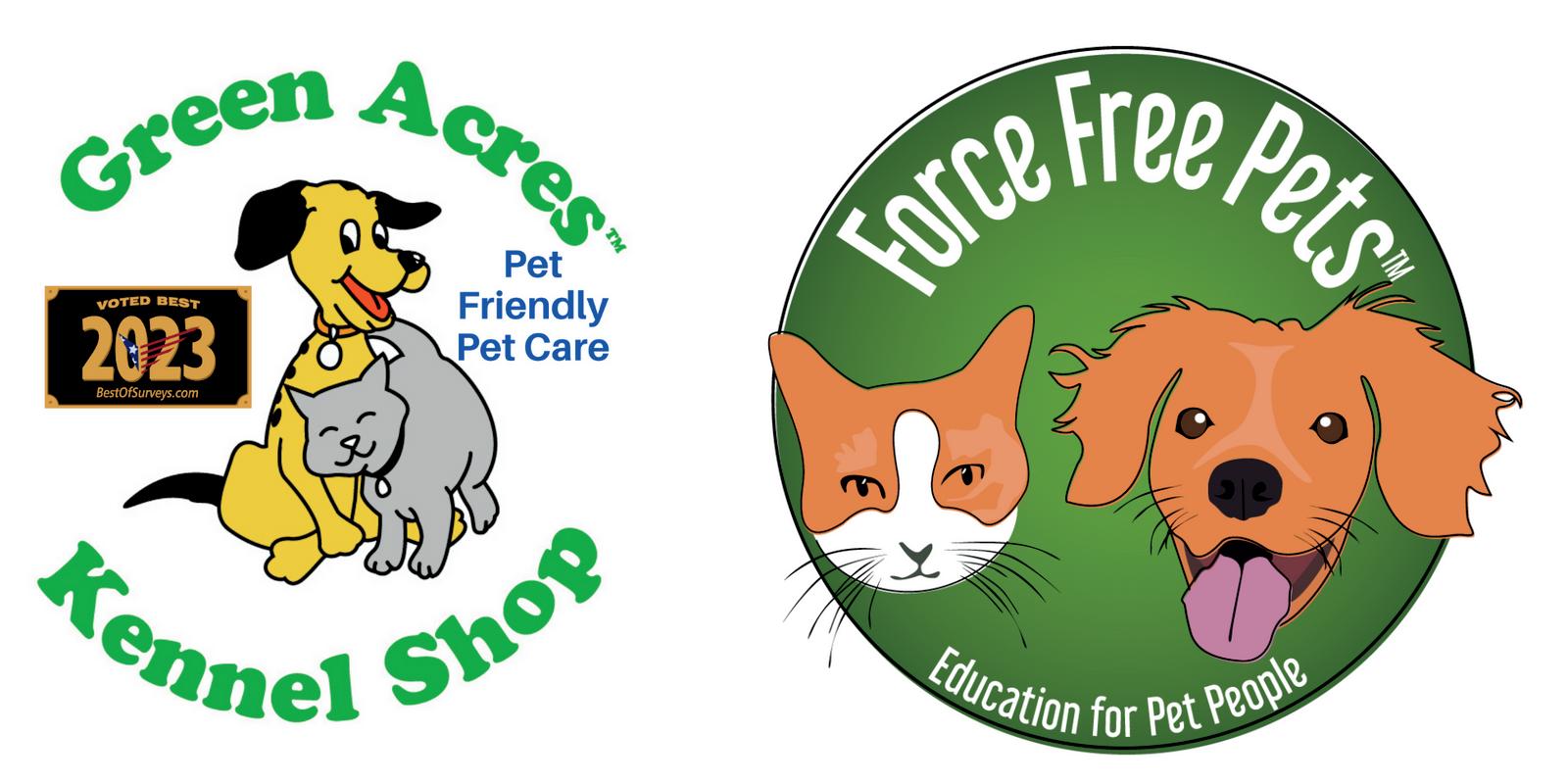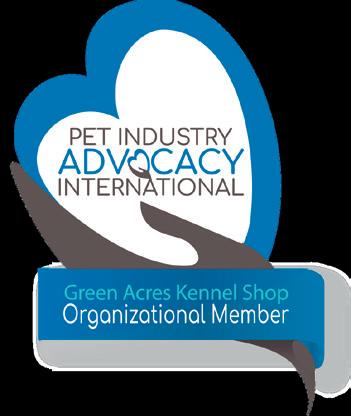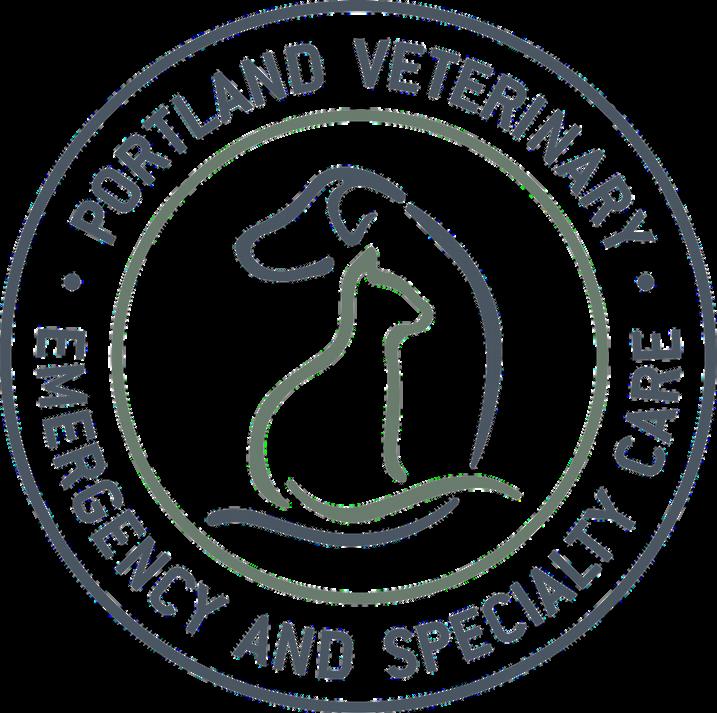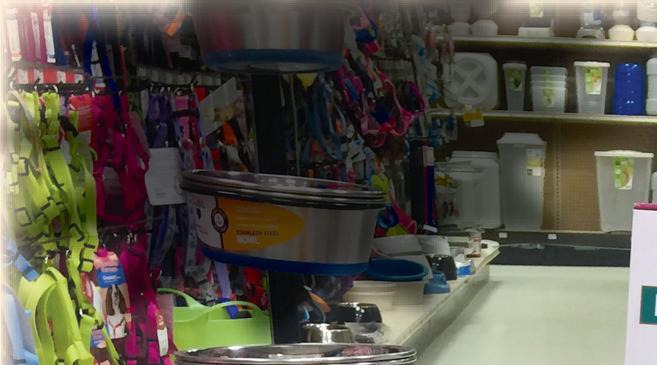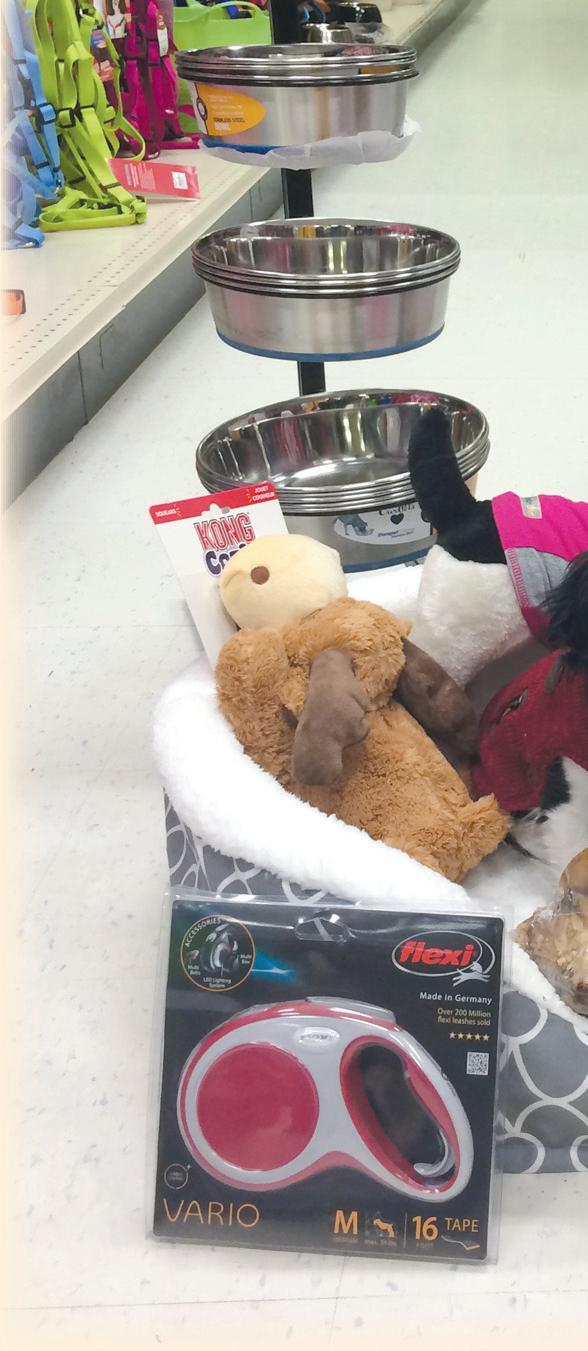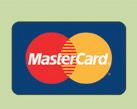



























Last year we ran a contest for the cover of our 2024 petMAINE guide. In November we had announced the winner but did not share the photo. So without further ado, here is our cover winner! This is Finn who was visiting Bristol, ME from MA. Finn and his family won a gift basket of goodies which include a gift card to Loyal Biscuit Co., a large, custom decorated cookie from Mountain Dog Cookie Co., a CoatHook grooming tool, Catnip toys from Proxima Designs and a matching set of PupLids from human and pet.)
Please stay tuned, we will announce our 2025 cover contest in an upcoming issue with guidelines and prize information!
If you would like to receive a copy of our 2024 petMAINE guide please email Jenn @ jenn@downeastdognews.com or you can view the online guide @ www.petmaine.com.
The Museum of Maritime Pets will host its inaugural mini-golf charity benefit on Saturday, May 4 from 10-1 at Golfer’s Crossing in Rockport ME. This event will provide an affordable and family-friendly way for local and statewide residents to support the museum and learn about its mission.
The Rockland Museum offers a vibrant array of exhibits and programs for Knox County residents and students, as well as those from other areas. Its innovative STEAM programs foster future entrepreneurs, explorers, leaders and teachers. The Museum does not charge admission and proudly participates in the Museums for All Initiative which provides access to cultural programs for underserved audiences.
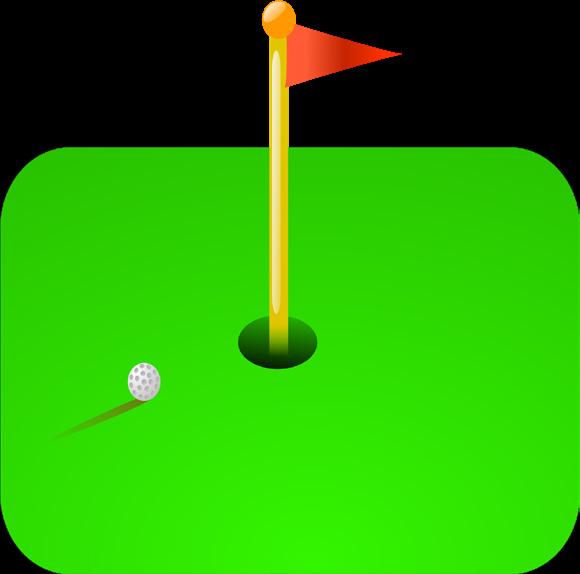
Registration for the event is by phone at (207)390-5909 or by email at seapets11@gmail. com. Entrance fee: $20 per adult; $12 for under 16. Prizes awarded for best team, best group and best score. Additional information available from info@museumofmaritimepets.org
Join us for this special evening with Sara Moore, a psychic medium for people and pets as she relays messages from the other side with clarity, gentleness and humor. This is a gallerystyle event; not everyone gets a reading, but spirit has a way of including more than just the intended recipient. Proceeds benefit Old Dogs New Digs. May 18, 2024, 6:30 - 8:00pm. First Universalist Church, 97 Main Street Yarmouth, ME Tickets at https://ODNDEveningWithSpirit.eventbrite.com

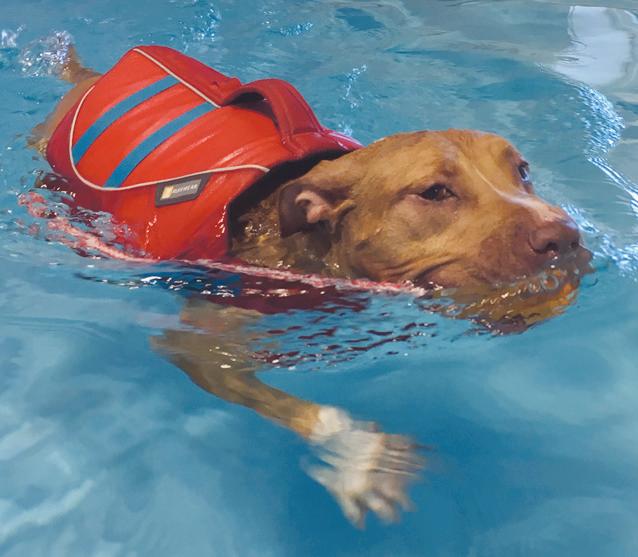











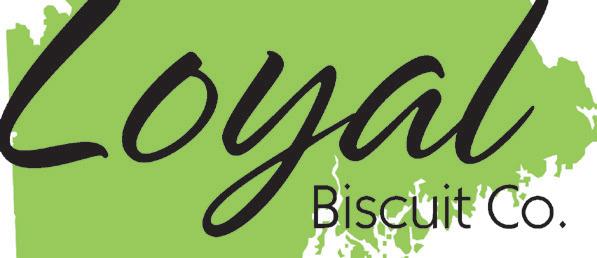




















•
•
•
Dear Dog News Readers,
Jenn Rich
COPY EDITOR
Belinda Carter
CONTRIBUTORS
Susan Spisak
Diana Logan
Sara Moore
Judith Herman
Carolyn Fuhrer
Don Hanson
Danielle Eifler GRAPHIC
Today as I write my letter, I am remembering my beautiful Reilly who was my previous Black Lab. She crossed over the rainbow bridge on this day. It was the saddest day of my life so far. Sending much love to my girl and I am grateful for the years we had together!
On a much happier note, my beautiful Pepper celebrates her 10th birthday on April 14th! I cannot believe it and wish time would slow down. I am not entirely sure what we are going to do but we will certainly celebrate! She is such a fun, happy, silly girl with a great personality and the best friend and companion a girl could ever ask for.
I am going to keep my letter short so I can share some photos of Pepper through the years and I’d also like to wish her cousin Kylo a happy belated 2nd birthday and happy birthday to her cousin Dexter who turns 8 this month!
Happy Spring! Keep an eye out for the ticks.
All the best, Jenn and Pepper
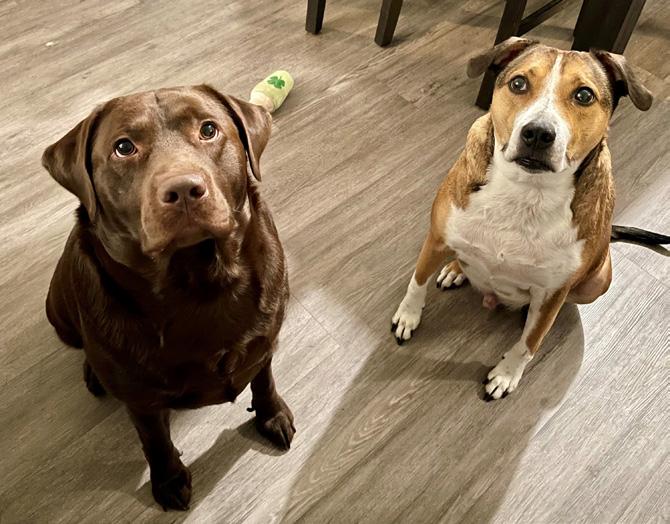



• Support animal welfare causes.
are those of its contributors and not necessarily those of the publisher. Content of ads is the sole responsibility of the advertiser. Every effort has been made to ensure the accuracy of the content and Downeast Dog News assumes no liability for any errors, omissions or claims made by its contributors or advertisers.




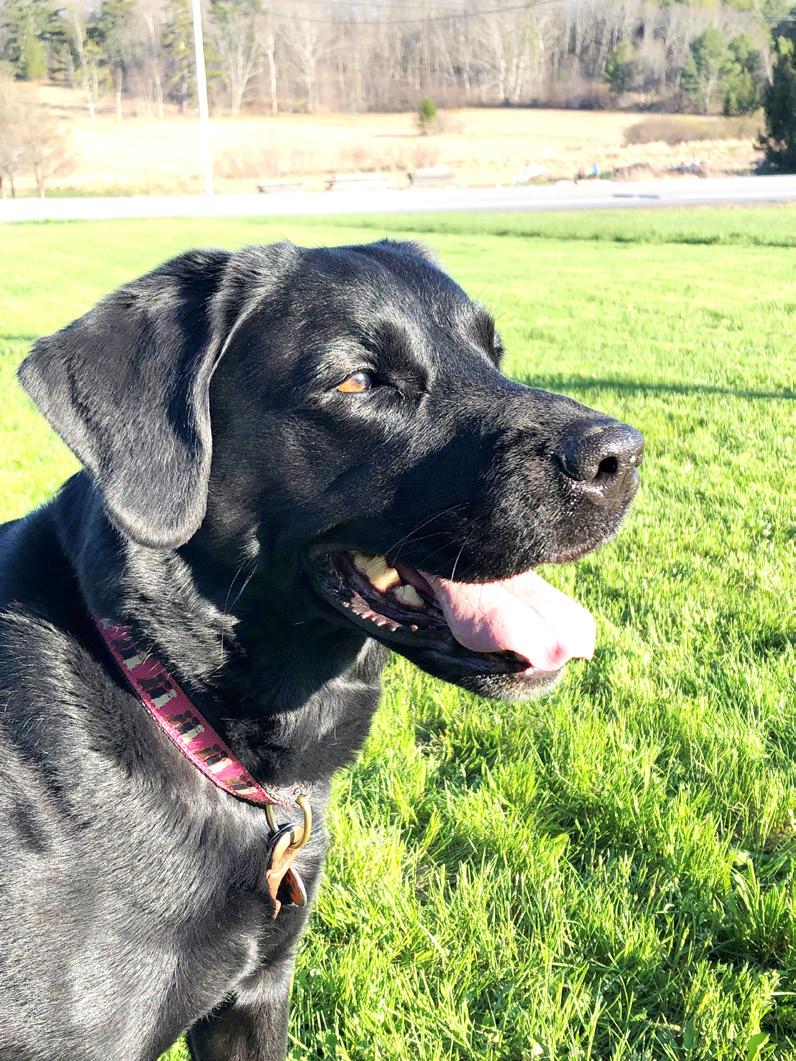
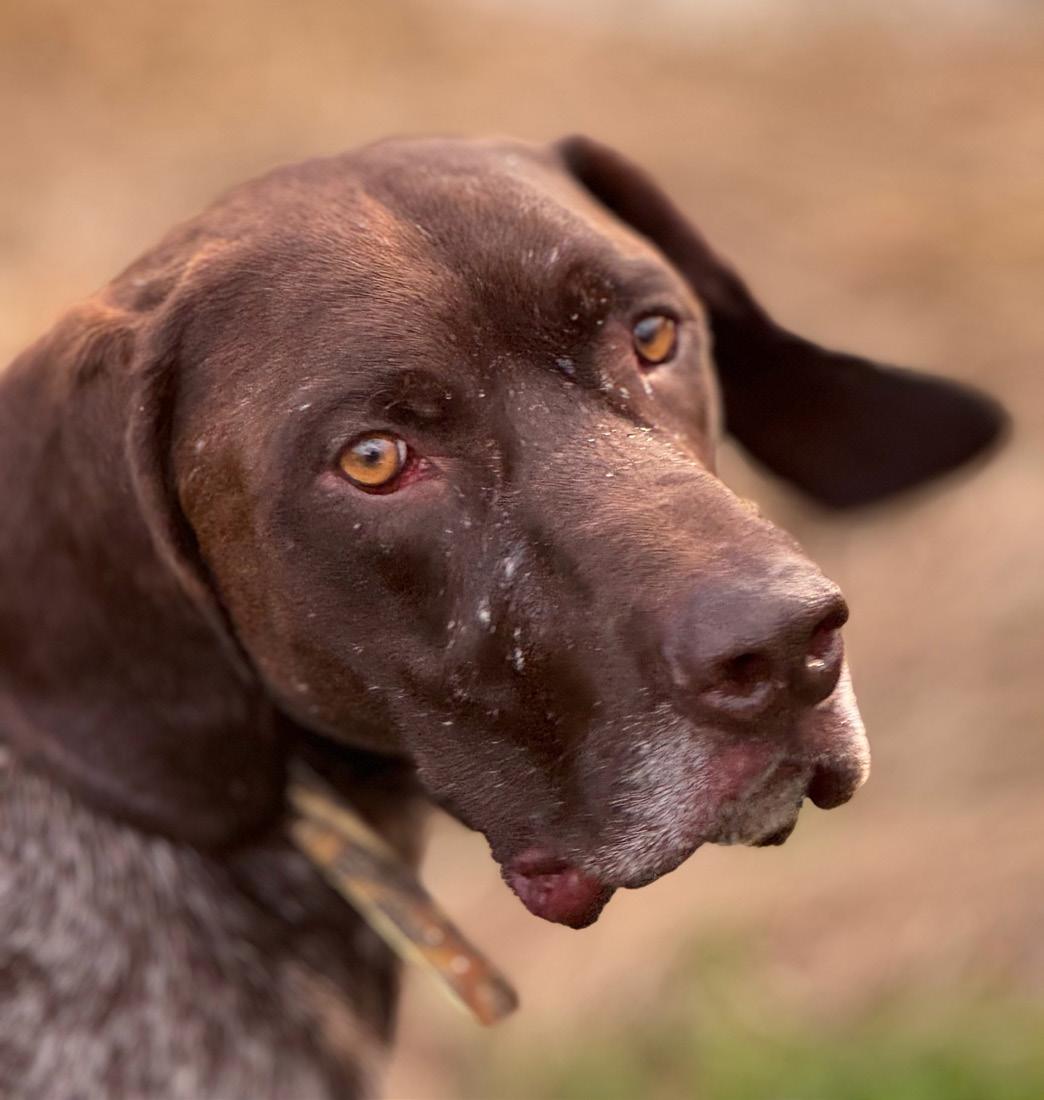
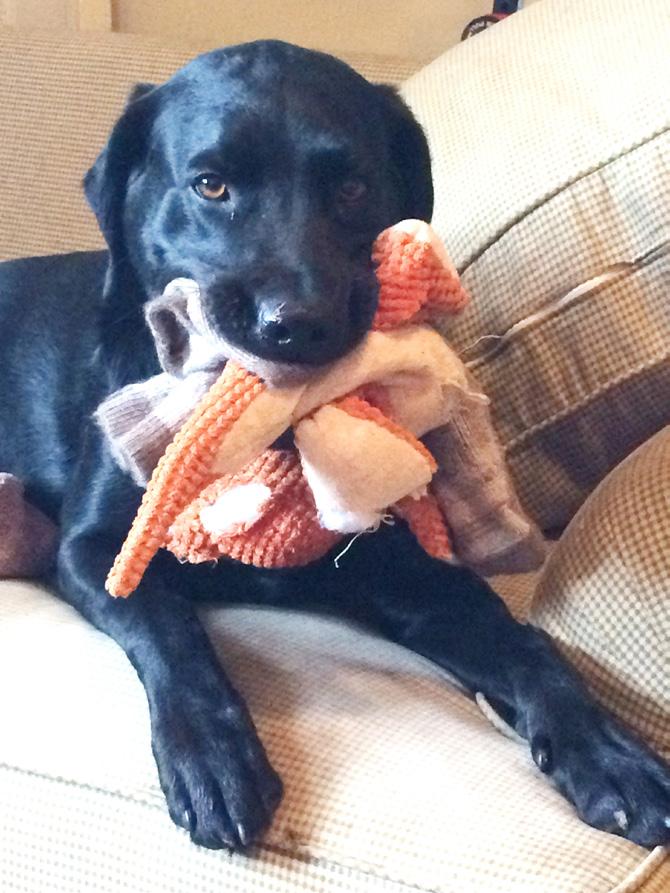

“A person who has never owned a dog has missed a wonderful part of life.”

Welcome to a spring edition of Furry Words! If you’re new, I’m a psychic for people and pets and love communicating with your fourlegged friends. Psychic insight is never a replacement for traditional medical care, but you can definitely use the information to better understand what your pet is trying to tell you. Let’s get right to it!
Tammy G. asked if Rusty and Gus, both mini Poodles, are happy to be brothers and living their best lives. Holy smokes! They LOVE each other and are definitely living amazing lives with you! When I see the possums from the kids movie, Ice Age, and how they run around and have a blast together, I know they are whooping it up! There’s only joy between them and even during mealtime, they play nicely. I asked them if they have any additional requests and Gus loves being manly, but if he were human, he’d shower after getting dirty and apply moisturizer. That’s really silly, but if he gets too stinky, he’d love a good cleaning. Rusty has no complaint and seemed slightly freaked out that I could hear him. Hahaha!

learned how to “hear” them answer. I do think honoring her with a pink frosted cupcake on her anniversary would make her heart so happy! My mom’s birthday is March 17th and death day is June 5th. I rarely even acknowledge the 5th because her joy for life deserves a birthday celebration instead! That being said, Sadie really just wants you to have a cupcake in her honor whenever the heck you feel like it! She is smiling and pretty proud of herself for answering you.
do hear him wandering the house at night!
Jody W. said, “Coming up on six years since our sweet Cockapoo Sadie passed away. I want to know if she is with our other dogs and to tell
her how much she was loved and is missed.” She is absolutely with your other dogs and family members on the other side. I know all of us hope to have undeniable visits from them when they pass, but she is having a grand time in heaven. You did right by her right until the end, and she appreciates that. You have the same ability I have to communicate with them, the only difference is I’ve
Jennifer F. said that they just lost their sweet Murphy a week ago at eight years to cancer, and they are devastated. “I’d love to know if you can get a sense of how he is.” Wow. It’s like he totally reset his energy to just before any bad things happened in his body. I see pure joy and a tremendous sense of who he was, what he was worthy of, and that he was beyond loved by all who knew him. He’s showing me a necklace made of hard macaroni/pasta like my son made in preschool. I don’t know if he’s saying that to mark time and give you a memory or if he considers himself one of your kids? Or if you were just gifted one, and he’s letting you know I’m not making answers up. LOL. Thanks Murphy! One more thing. You are not going crazy; you
Hannah B. had a dark orange Golden named Noah who lived to be nineteen years old. “I wonder if he thinks of me so many years later.” Ok, what he says may sound confusing, but I’ll explain. No, he doesn’t really think of you in terms of peeking down from heaven. He says that you of all souls know that there is good and light in the world and that we are all worthy of receiving it. You felt that even as a child, and when the world got mean or prickly, you would cry. He loved your purity and awareness, so in heaven he’s kind of reminiscing about the time he had with you but wants to wait for the day you join him to sit with you and hear about your journey from your own perspective. I’ve NEVER had a dog say something like that, and it’s beautiful. Keep shining!
Thank you to those who submitted questions! If you’d like a more in-depth reading or FMI go to www.enlightenedhorizons.com and follow along on Facebook at Sara Moore Enlightened Horizons. There are many upcoming events, classes, and podcasts designed to help you find peace with your journey and the people and pets we have lost but will one day meet again.
Q. Can dogs be autistic? My dog seems to be so distracted he’s not learning anything!
A. The autism spectrum disorder in humans is very complex and has several degrees of severity. Researchers have speculated that dogs can be autistic. As with people the understanding of this condition in dogs is mostly unknown.
In the 1960’s researchers studied dogs they presumed to have Canine Dysfunction Behavior (CDB). CDB is the name for the autism like condition in dogs. The exact cause is still unknown, but it is presumed to be congenital. The genetic predisposition for the lack of mirror neurons in the brain may result in this condition. Mirror neurons enable pups to imitate social behaviors of other dogs, and without them they cannot learn and socialize normally. Most of the research is looking at tail chasing and trance-like behavior in bully breeds. Though extremely

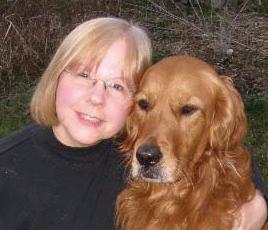
rare they found CDB to be more prevalent in males than females.
Symptoms attributed to CDB can be repetitive behaviors, like compulsive tail chasing, trance- like behavior, eye contact avoidance, aggression, preferring solitary activities, and difficulty expressing emotions and communications like other dogs, such as tail wags and
ear position. They do not connect with the guardian or other dogs in activities such as walks, feeding time, and petting. These pups are hypersensitive to environmental stimuli. Their reaction to the environment may be inappropriate and exaggerated. When in overstimulating environments they may withdraw, shut down, and leave to a quieter, secluded place, or become over-reactive and aggressive.
These behaviors are identified at four to eight weeks of age before they are placed in a home. Your veterinarian may see behaviors that concern her. The first puppy visit is very important to pick up on behavior and physical flags. If there are concerns, your vet will do tests to rule out other medical problems. If they are all normal, a referral to a board-certified behavioralist maybe in order.
These dogs may need medications for anxiety and aggression. Their environment will need to be quiet and without surprises. Sharp noises and changing schedules may be an issue and will need to be addressed. Sensitive, positive training will need to be implemented from the start.
This is a lifetime commitment and takes a special guardian and home environment to give this little pup a safe and comfortable home.
Many of these behaviors are seen in puppies and adolescents. Being easily distracted, mouthy, overexuberant, environmentally aroused, having excessive energy, and having anxiety can all be symptoms of a normal active puppy. If the pup is a hunting or herding breed but you are sedentary, these could be normal and expected behaviors in that environment. CDB is a congenital neurologic birth defect, not a misunderstanding of a healthy dog’s needs. Adopted dogs can exhibit these behaviors because of previous life experiences and genetics. Without a crystal ball no one could tell you if these behaviors are CDB or just an untrained free spirit.
Remember after buying a pup of any age, take him to your veterinarian for a complete physical. Find a good trainer. Then enjoy a lifetime of love.
www.mainehomeopahticvet.com
were using human masks in the field, or improvising with other items, to get pets oxygen after smoke inhalation.) He founded the all-important nonprofit POM Project to equip all state, fire/rescue departments with POMs free of charge to accomplish his goal, “Job #1 – Save Lives.” As of January 2024, he’s donated over 650 sets, and he figured a way out to purchase those that weren’t donated by businesses—he teaches Pet First Aid and CPR Training for a nominal fee. The class fees are used to purchase POM sets, so it’s a win-win for students. They learn important tools and know they are helping a crucial animal cause.
Bobby went through the necessary steps to be certified to teach lifesaving dog and cat Pet First Aid and CPR classes to individuals and groups. He’s offered the classes and continues to offer them at venues such as pet stores, fire departments, libraries, vet offices, and grooming salons who allow him to teach at their facilities without a fee.
Pet First Aid Basics & the App
Knowing the basics of Pet First Aid is proactive and learning and understanding your dog’s (and cat’s) body language is key. Things to know are their temperature, heart rate, breathing rate, and gum color. Make a chart of what’s normal for your dog’s size or breed, so you can recognize when things are abnormal. Ask your vet for input on your next visit as well.
Different types of injuries and illnesses require specific steps. In many cases, it’s hard to tell whether a dog requires urgent veterinary care or can be treated at home—but always give your vet a call. Start by looking for any obvious abnormalities or concerning symptoms. Secure your
pet if necessary, assess the situation, and convey it to your medical professional.
If your pet has a severe injury or condition, rushing straight to a veterinarian is often better than wasting time trying to further assess him yourself. Again, let your vet know you’re on the way. If it’s after hours, proceed to the area all-night vet hospital.
There’s a helpful free First Aid App by the ARC that can guide you through most issues. “I think it’s not a bad source…it’s worthwhile having,” Bobby said of the app. He stressed to stay away from the “million” online posts on social media that aren’t reliable info. The ARC app is thorough, explaining a plethora of problems and how to handle such as allergic reactions, bleeding, bloat, blood sugar issues, and burns. It includes step-bystep instructions, videos, and images for more than 25 common first aid and emergency situations. It has detailed instructions for CPR by dog size, so you can perform it until you get to the veterinarian.
The Pet First Aid app can be downloaded by texting ‘GETPET’ to 90999, by going to redcross.org/apps, or by searching for “American Red Cross” in app stores.
The ABC’s of CPR
The ABCs of CPR, cardiopulmonary resuscitation, are airway, breathing, and circulation. “As individuals, we hope we never have to use these, but they can be lifesaving depending on the severity,” Bobby said.
CPR involves chest compressions with or without artificial respiration. It is only to be used on your dog when you cannot feel or hear his heartbeat and he’s not breathing. This may occur for a few reasons: trauma, choking, or illness.
Before performing CPR, keep in mind that it is potentially hazardous
and can cause complications or fatal damage if performed on a healthy dog. The ARC app can walk you through the steps via written instruction and videos appropriate for your dog’s size until you get to your vet. (If you don’t have the phone app, follow the online steps, redcross.org/take-aclass/cpr/performing-cpr/ pet-cpr.) Bobby also shared, “I have found you can get some very reliable videos on YouTube, with actual veterinarians demonstrating CPR and where the heart is.”
Bobby added that general knowledge of compressions and starting CPR is best for your animal--doing nothing can be worse. It might keep your dog alive long enough to get to the vet for lifesaving treatments. “Again, it’s one of those things as individuals we hope we never have to use, but if we do, we’re prepared.”
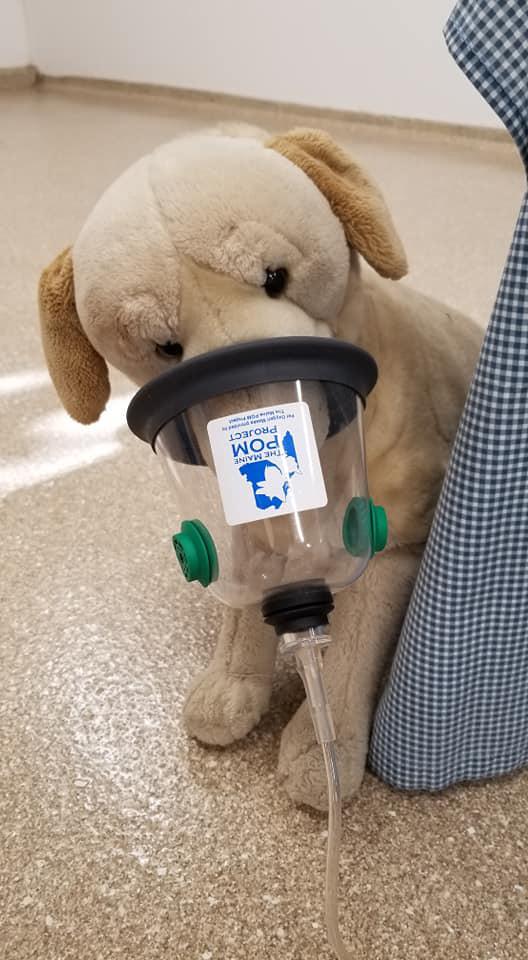
A home and travel Pet First Aid Kit is essential. A first aid kit is critical to ensure your injured canine moves on the path to recovery. Keep one at home and another in the car to ensure you’re always prepared to patch the problem before going to the vet.
Bobby said Pet First Aid Kits and human kits are similar. He admitted for the average person, purchasing kits can be expensive. Many are available on Amazon—look for an American Red Cross approved one. If preparing your own, gear your kits to your activities. For travel and day outings, be sure to have a portable water bowl, wipes, a towel, Benadryl in the event of a sting (speak to your vet before purchasing), a leash,
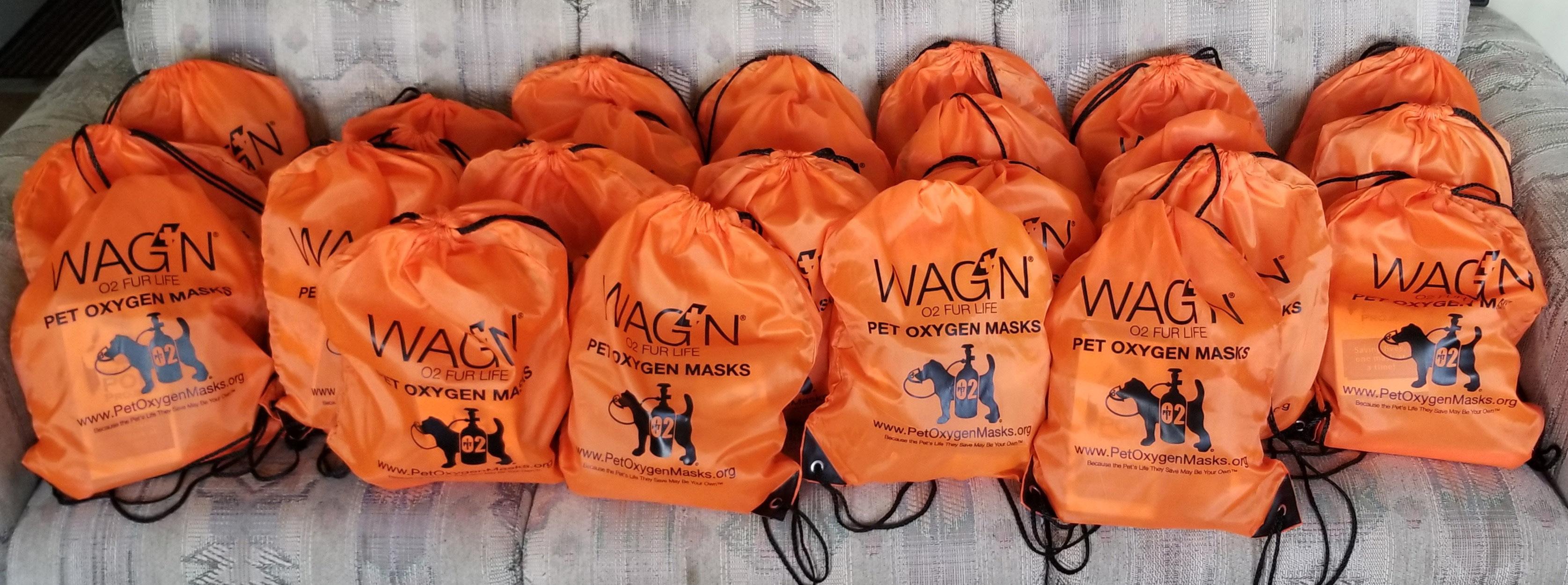
Bobby is now scheduling Pet First Aid/CPR classes for Spring/Summer 2024. If you or your organization would like to host a class in Maine or New Hampshire, please let him know at the site below.
He charges $80 to each student, which in turn is used to purchase a set of small, medium, and large POMs. Students receive a book on pet CPR and a lifetime certification, and the five-hour class is a particularly useful tool to animal owners.
He admitted he loves teaching them and knows of at least one situation where a graduate was able to utilize the training. A pet store manager took the class and a week later a shopper brought her large dog in. Within moments, the dog collapsed and began having a grand mal seizure. Bobby was told chaos ensued, but the manager was calm and took charge, following her learned steps. She then reassured the owner the dog would be fine. Once the dog’s episode was over, a nearby vet was called and the owner quickly transported him there.
“Hopefully folks get something out of the classes,” he said. Animal welfare, the POM Project and Pet First Aid go hand in hand to Bobby, “They’re all equally important. “They really all mean a lot to me.” Check his schedule for upcoming Pet First Aid Classes at mainepomproject.org/ or facebook.com/petoxygenmask/.

We, as a culture (or maybe as a species), have a strange hangup with food. Food fills us with emotions and assumptions and strange relationships (chocolate!). There are still many people who have a hard time even considering using food for dog training, thinking it somehow will diminish the relationship of that perceived (ugh) alpha status we so strive to hold over our dogs. Food is quite simply a tool, just as fetch, attention, affection, praise and others are (or money, play, vacation, etc. are for humans). The difference lies in how the dog values these things at a given moment. To us, things that we think should be rewarding are not in the eyes of the dog (praise or a pat over the top of the head are good examples).
Another thorny factor is the word itself: “treat.” “Treat” carries with it the connotation “fancy” or “unnecessary.” It’s practically a given that if somebody sees you giving your dog treats in public, you will hear something along the lines of, “that dog sure is spoiled” (“spoiled” is the keyword, always). “Treats” can be nutritionally valuable and enhance a dog’s diet, like a snack of almonds and raisins might be for me. Is my snack a treat? Are we talking about “treats,” “snack” or “food?”
The word doesn’t matter. It’s all in the eyes of the beholder: the dog.
Whatever you want to call it –“calorie training” done right, with good training skills, means good habits can be jump-started and treats and rewards reduced more quickly. Done wrong (as a bribe or, for the human example, giving a new employee 2 weeks’ vacation before any work is done) means the dog might not do

anything until he sees the goods first (or the new employee might high-tail it after his free vacation!).
One of our previous dogs found the ball to be extremely rewarding (by the way, I trained a reliable fetch with food). I used fetch a lot to reinforce certain behaviors. Through rewardbased training, the trained behaviors themselves become rewarding and in turn sprout other behaviors. When done well, you can get multiple behaviors before that reward is granted. It's a continuum.
If we aren't paid from time to time for our efforts, we won't be interested in continuing to go to work no matter how much we love our boss. If our boss decides that she'll replace our salary with praise, I'm not sure about you, but I'd need to find another job. After all, I need money to be able to buy food to sustain myself! There I go again… it’s back to food.
As much as we'd like to believe that our dogs should do anything to

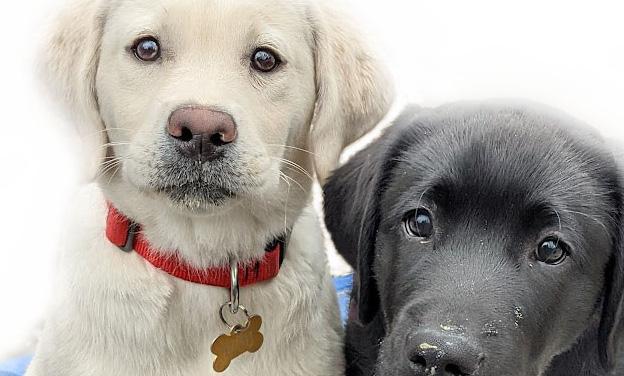

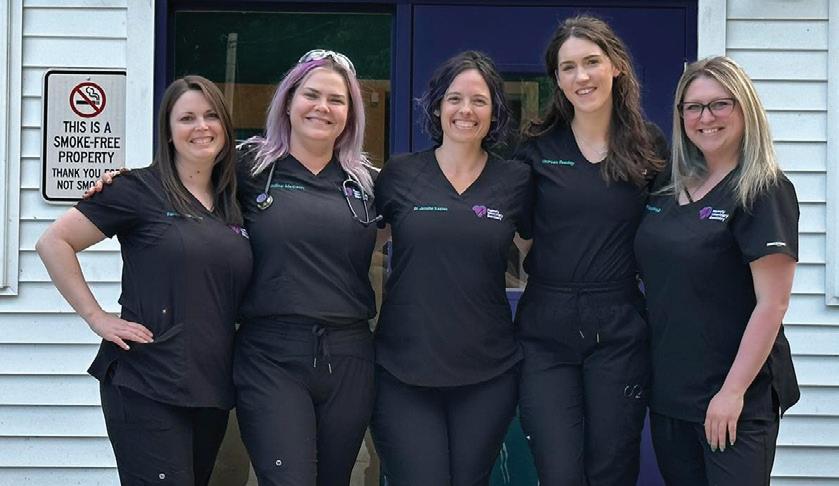

please us, just for us being humans and therefore Masters of the Universe, they have one thing in mind above all else: themselves. One of my favorite quotes is, "the idea that a dog has an innate desire to please humans is a direct result of our desire to be demigods." If dogs really had the desire to please or to do things "for" us for nothing (or for nothing but praise), dare I say that we'd not have any homeless dogs and no one would relinquish a dog for behavioral issues. And I wouldn't have the best job in the world!
The difference between people who use food for training their animals and people who resist it is that the latter group gives away all their dogs’ calories for free. Dogs need to eat, after all, so they are getting food at some point. I look at a bowl of kibble set before a dog to eat freely from and think, "wow, there are a hundred behaviors in there... so many lost training opportunities!" To make matters worse, most dogs are overweight, so they’re getting even more for nothing! No species lives in a nothing-forsomething world.
I used to have a disdain for using food in training. Then, after some frustration on both ends of the leash and poor results, I started educating myself and came to terms with the fact that it was my own personal hangup over the concept of using food that was preventing success. My desire to become an automatic demigod in the eyes of my dog Dory was driving me to poor training. It required some soul-searching and deflation of ego to accept this truth and move on. Move on I did, and boy oh boy did my dog thank me for it! Instead of diminishing the relationship, she saw me in a whole new light, like that chef friend who from time to time invites you over to dinner to be the first victim in some glorious culinary experiment. “Wow, can’t wait to eat at Jane’s house again!”






Timing… beyond rewarding.
Besides rewards, dogs need clarity - they need to know WHY they are getting rewarded. If we are in control of a motivator, we have a training moment right in front of us. This is where the clicker (or verbal marker) comes in - it allows us to give the gift of clarity to our dogs. It's purely cause and effect; a fact that we all live with every day of our lives. The clicker means efficiency, predictability, understanding. Combine good observation and good timing with a clicker and a reward and wow!
Consequence drives behavior. Consequences must be meaningful. Whether we are human, dog, cat, zebra or goldfish, these statements hold true. It's how we all live and learn. We have a huge influence on the type of relationship we share with our dogs. It’s a choice not to be made lightly.
Now, are you going to throw all those training opportunities into your dog’s bowl and waste them away or are you going to see if he might “work” for some? Even better, allow your dog to experience some canine culinary delights in the form of healthy and tasty snack foods he might not normally get. It’ll make him eager for more training!
Readers: Last month's column on punishment may have given you the false impression that I was deriding the sport I referenced. If you felt this way while reading it, I apologize. The sport is widely popular and rightfully so. My experience was unique and does not reflect the typical experience of the sport. You could replace my example with anything ("learning bagpipes," "learning to play chess," etc.) and the same principles would apply. My intent was to demonstrate the potency and potential long-term effects of punishment, particularly if punishment is the first thing a learner experiences, which was my case.






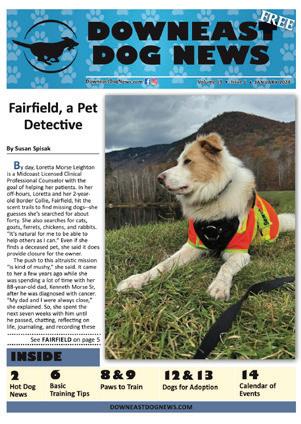




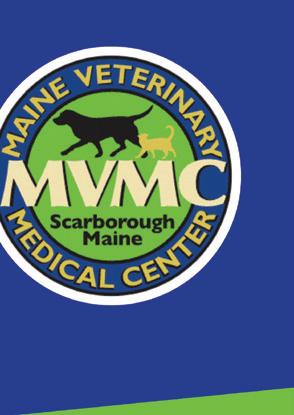

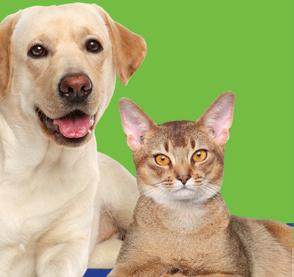
What is Vestibular Syndrome?
Vestibular Syndrome consists of a group of clinical signs that indicate dysfunction of the vestibular system. The vestibular system is part of the nervous system that is responsible for balance. The vestibular system has 2 main components, the peripheral vestibular system and the central vestibular system.
The peripheral vestibular system consists of the peripheral vestibular nerve that travels deep within the middle and inner ear. The central vestibular system is located in the brainstem. Basically, the vestibular system's control center is in the brain which receives input from the sensory component of the peripheral system in the ear.
The peripheral system senses changes in movements and head position and relays this information to the brain so that posture can be adjusted appropriately. Classic signs of vestibular dysfunction include a head tilt, circling/rolling/falling to one side, and abnormal, rapid, rhythmic eye movements (nystagmus). The type and character of these signs can sometimes give clues as to whether or not the problem involves the central or peripheral vestibular system, but it is not always possible to determine the exact location.
What Conditions Cause Vestibular Signs?
The most common diseases that cause peripheral vestibular signs are ear infections and idiopathic vestibular disease (the term idiopathic means that no underlying cause can be found). Causes of central vestibular signs include brain tumors, strokes, toxins, metabolic diseases, and encephalitis/ meningitis (infection or auto-immune inflammatory diseases). Because the potential cause and therefore the prognosis is often more serious with central vestibular syndromes, it is helpful if it is possible to determine if the vestibular signs are more consistent with central or peripheral vestibular

syndrome. Again, it is not always possible to differentiate between these locations.
How Can The Cause of the Vestibular Signs Be Diagnosed?
Diagnostic testing often involves multiple tests to try and rule out the other possible causes discussed above. Bloodwork may be performed to assess the overall health of the patient as well as x-rays of the chest and possibly abdominal x-rays or ultrasound if indicated. To visualize the ear and brainstem, an MRI is most useful. A CT scan also can be performed of this area though the detail that is obtained with an MRI is generally superior. A cerebrospinal fluid analysis and infectious disease testing may also be recommended.
What Is The Prognosis Associated With Vestibular Syndrome?
Prognosis depends on the underlying cause of the vestibular signs. Infections in the ear may be treated with antibiotics and surgery if necessary. Brain tumors may be amenable to surgical resection or radiation therapy depending on the tumor type and precise location. Central nervous system infections can sometimes be treated with antibiotics, however, the response to therapy depends on the particular infectious organism involved. Auto-immune inflammatory diseases such as Granulomatous Meningoencephalomyelitis (GME)


Imay respond to immunosuppressive medications for a period of time. Patients often improve if they have experienced a stroke depending on the underlying cause of the stroke. Response to therapy for metabolic and toxic causes depends on many factors.
One of the most common forms of vestibular syndrome is Idiopathic Vestibular Disease. This is also known as Geriatric or “Old Dog” Vestibular Disease. Cats and dogs can both be affected by idiopathic vestibular disease which involves a sudden onset of vestibular signs and no underlying cause can be found. These signs often resolve over time (marked improvements are usually seen within 24-72 hours) though head tilts can remain. Nobody knows for certain why these signs can occur suddenly and then resolve quickly but relapses can occur. Idiopathic vestibular syndrome typically only causes signs that are consistent with peripheral vestibular involvement. With Idiopathic Vestibular Disease, all diagnostic tests should be within normal limits. The prognosis for Idiopathic Vestibular Disease is good. How Is
Treatment, again, depends on the underlying cause for the vestibular signs. With Idiopathic Vestibular Disease, supportive care is most important. Supportive care involves medications to help with the nausea
associated with vestibular signs and sedation to calm the patient if its lack of balance is causing distress/anxiety. Providing the patient with a wellpadded area will keep the animal from injuring itself due to its lack of balance control. Supporting the patient with a sling and harness when walking is also helpful. Keeping the patient in an environment that is well lit is recommended. A dark environment can make vestibular signs worsen due to the fact that the vestibular system uses visual stimulation to coordinate movements. Elevating food and water bowls can also help decrease imbalance which can occur with changes in position of the head. Using yoga mats, booties, or throw rugs on slippery surfaces can also help with incoordination.
It is also very important to watch for signs of worsening at home that could indicate an underlying disease that is responsible for the vestibular signs. The signs associated with Idiopathic Vestibular Disease generally do not worsen.
One of the most important things to remember if your dog develops vestibular signs is that even though the signs can be very severe, there are many conditions that can cause these signs, and many are treatable and may resolve on their own in time.



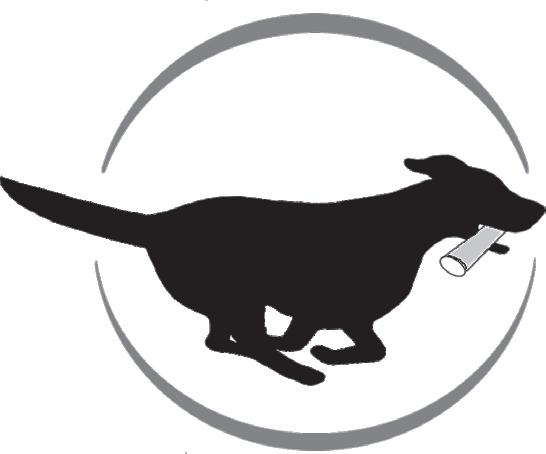

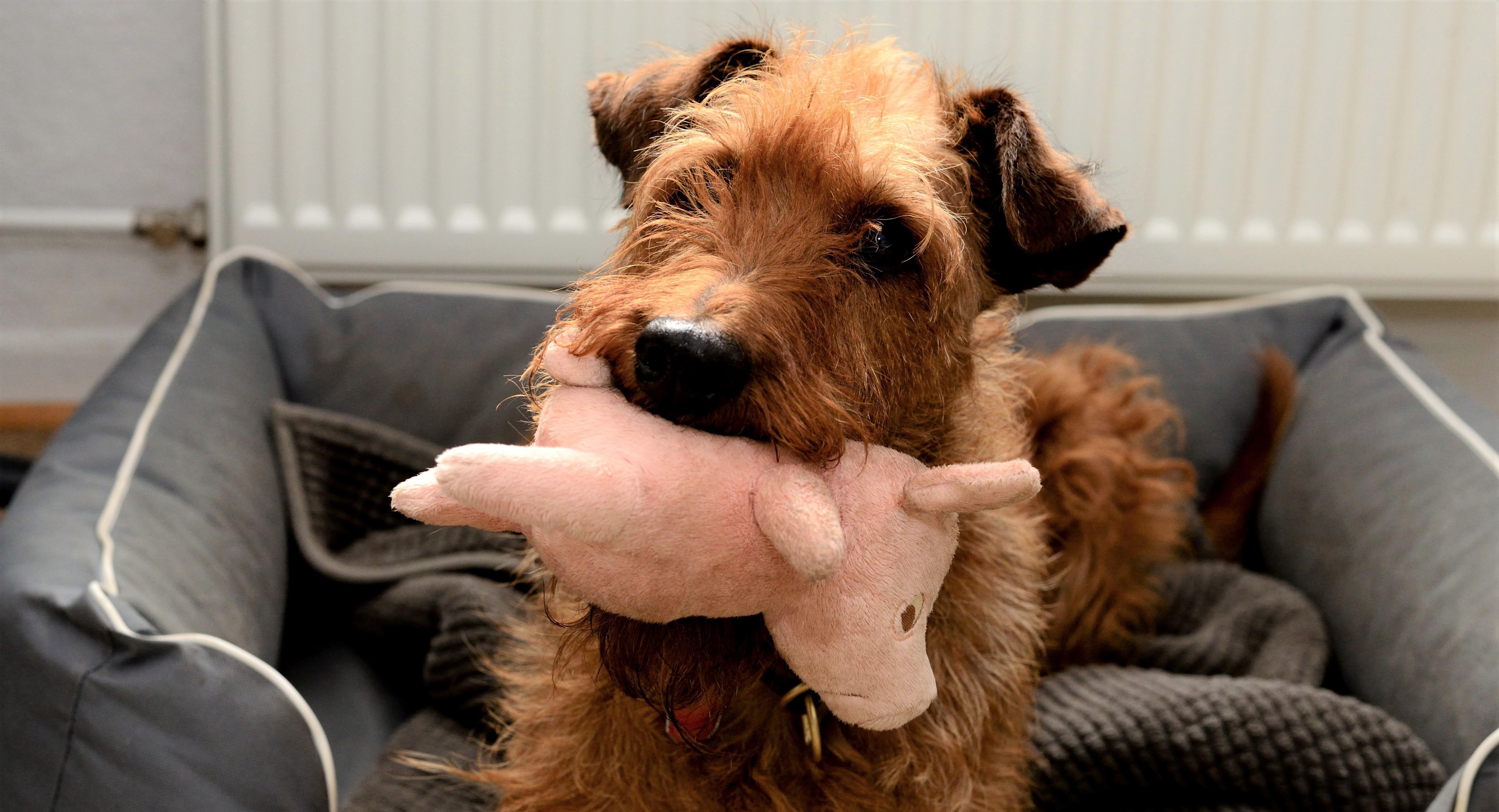
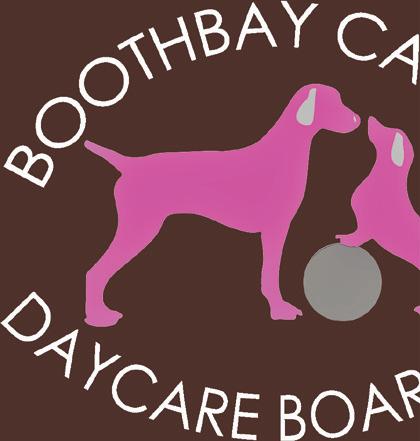





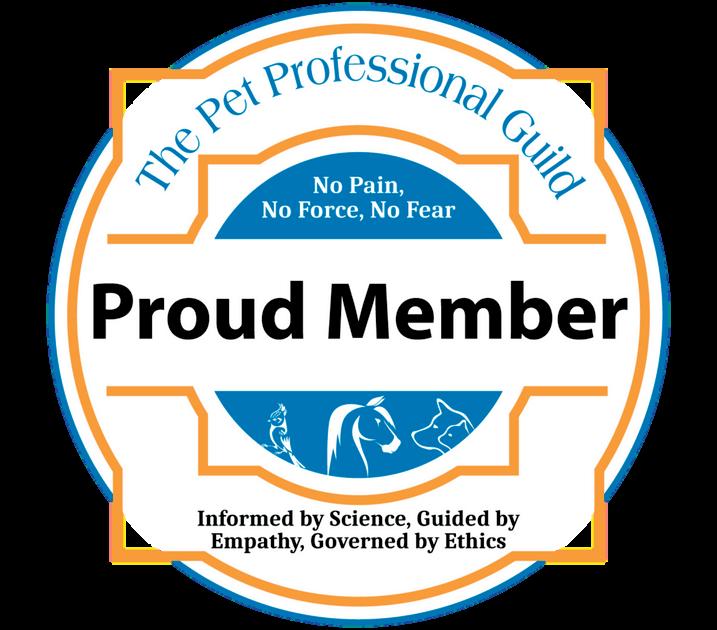


Planning a vacation and need someone to care for your pets while you are away? Are you a working pet parent and need someone to take them for a walk while you are at work?
Some dogs may be fine to stay home all day, while others may need at least one bathroom break and some exercise. In this case a dog walker might be your answer. What if your dog needs more attention and frequent bathroom breaks? Perhaps a pet sitter or daycare may be a more suitable option.
The first question you need to seriously ask yourself: Is daycare a good fit for my dog? Some dogs do well in a daycare environment, however it may not be the best choice for every dog. Dogs who are anxious, reactive and/or struggle with interactions with other dogs are not good daycare candidates.
It is important to approach this from your dog’s perspective. Is your dog comfortable in big groups or with just a few other dogs? Do they prefer to be the only dog? What is their activity level? Do they get over excited with too many stimuli? Do they have special needs that require one-on-one attention? Make a decision where he will be most comfortable and at ease which might mean having someone












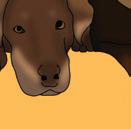






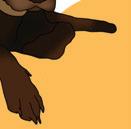







look after him at your own home.
Choosing a caregiver is not a task that should be taken lightly. You could start with a recommendation from someone you trust, such as a family member or your veterinarian, but do some research and figure out who is the best fit for you and your dog.
Here are some helpful tips to consider when looking for a pet sitter, daycare, or boarding facility.
• Can they provide proof of insurance and are they bonded?
• What kind of training do they have? (e.g., basic care, animal behavior/body language, first aid, etc.)
• What are their emergency plans for injuries or sickness?
• What type of corrections do they use, if any?
• References?
• Have them meet your dog to see how they interact with them. Is your dog comfortable with them?
Pet Sitters:
• Do they have a backup if they become ill while caring for your dog?
• Will they walk your dog and have playtime?
• Do they have a contract listing fees and services?

Daycare/Boarding:
• Does the facility look and smell clean?
• Is the fencing secure and is the area hazard free?
• Is there enough staff to ensure safety?
• Are pets required to be current on their vaccinations, including the vaccine for canine kennel cough(Bordetella)?
Daycare:
• Do they conduct temperament tests to assess each dog’s behavior and personality before accepting them?
• What type of activities do they provide? Is there a rest time? Will your dog be crated at any time?
Boarding Facility:
• Does each dog have his own adequately sized kennel?
• Is there sufficient ventilation and light? What temperature do they maintain?
• Is there an indoor-outdoor run or schedule for exercise?
• Are resting boards and
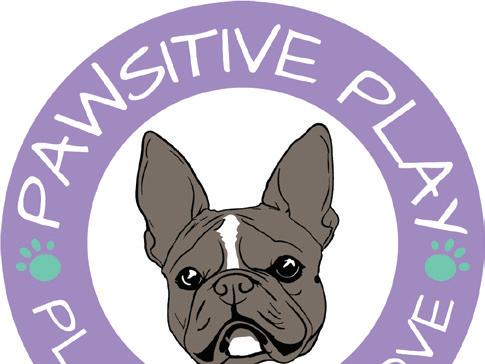
bedding provided to allow dogs to rest off the floor?
• What veterinary services are available?
• Are other services available such as grooming, training, bathing?
• How are rates calculated?
If your dog takes meds or is on a special diet, leave explicit instructions and make sure the meds and food are well stocked. Leave a list of phone numbers including your vet’s, how you can be reached while you are away, and perhaps the number of a local friend or family member.
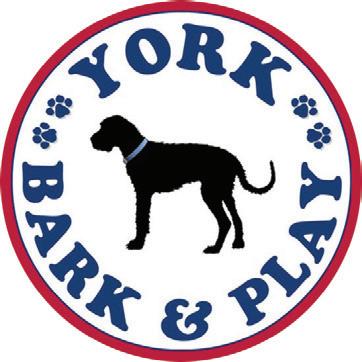


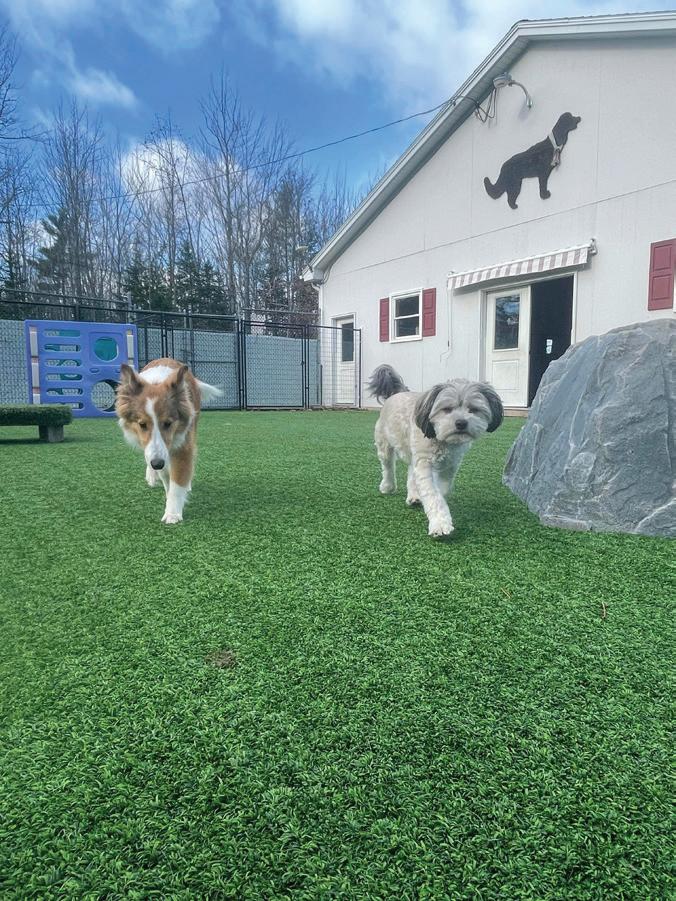


Most people think of tracking with their dog as being out in a field or fields and woods. There are two tracking events that use fields and woods: a TD (Tracking Dog) test is held in a grassy field; a TDX (Tracking Dog Excellent) is held in fields and woods. Yet there is a whole other world of tracking that many people know little about –urban tracking.
AKC offers two titles in urban tracking; an introductory title, TDU (Tracking Dog Urban) and an advanced title, a VST (Variable Surface Tracker). These tests are held at college campuses, schools,

Carolyn Fuhrer
Somerville, Maine


business parks, and other urban areas that offer a mix of pavement, grass, buildings, and other nonvegetative surfaces such as the infield of a baseball field or bark mulch.
The thing I like best about urban tracking is that there are so many areas available to train. So, if you enjoy tracking, you can really extend your range of possible sites to practice by doing some
Classes
207-691-2332
carolyn@northstardogschool.com
http://facebook.com/NorthStarDogTraining

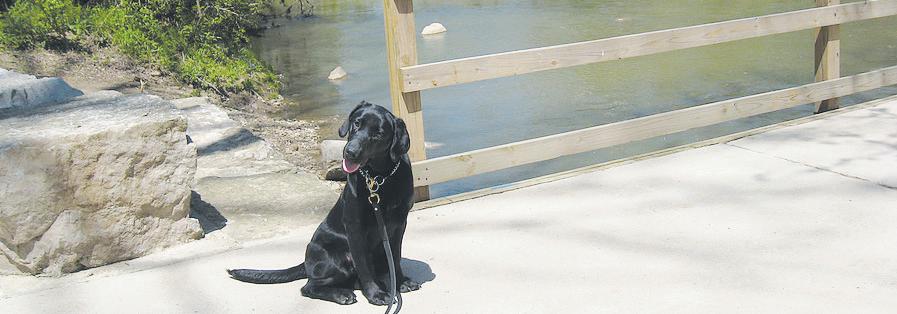



urban tracking. A few weeks ago, we spent a wonderful weekend teaching dogs to track in the City of Rockland- nice views, good food, and fun tracking opportunities. By including urban tracking in your training, you can still track when grass in the fields is too high and needs to be mowed or if it is not the time of the year you want to be in the woods. By teaching urban tracking, you and your dog can track almost all year long. Keep your tracking gear in your car and put out a small track when you run an errand. Opportunities are all around us.
In tracking, we are teaching the dog to follow the human scent the dog is shown at the start. In urban tests, there are no physical obstacles. The rules state, “the level of physical difficulty should be such that it will permit all AKC breeds and handlers of any age to participate. Ordinary stair steps are not considered to be an obstacle.”
AKC tracking tests verify the dog’s ability to recognize and follow human scent while adapting to changing scenting conditions. The test is designed to be as practical as possible. The team of handler and dog working in tracking is a wonderful thing to watch. The dog is the only one who can detect the scent. The handler must
learn to understand what the dog is communicating and trust the dog. The handler is there to understand and support the dog’s work. Few dog sports require the understanding, patience, and teamwork necessary over an extended period of time that is demonstrated by successful tracking teams.
Even if you have no desire to enter a test with your dog, teaching your dog a new skill in which the dog gets to use its nose and hunting instinct can be very satisfying to most dogs. Tracking is also a sport that you can do with an older dog and will enrich its time spent with you as well as engage its mind.
Would you like to see what tracking is all about? There are several tracking events coming up in the next few months: an urban test in April and another in June; a tracking instinct experience a morning in May; a field tracking test (TDX) in May and a Beginners Tracking workshop in June – all put on by On Track Agility Club of Maine. WATCH the Downeast Dog News Calendar for dates!














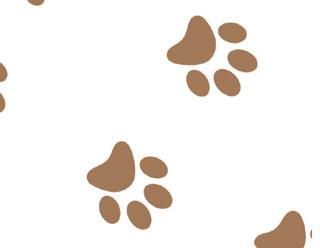












Although not found in every home, tobacco and tobacco cessation products that contain nicotine and marijuana used for medical or recreational purposes, can legally be in any home in Maine. Even if these products are not in your home, your pet may find them outdoors, in the park, or on a walk. The nicotine in the tobacco and smoking cessation products and THC (Tetrahydrocannabinol) in marijuana edibles and smokables can kill a pet.
Nicotine is a psychoactive and highly addictive substance found naturally in tobacco. Tobacco products are a nicotine delivery system. These products include


cigarettes, cigars, pipe tobacco, chewing tobacco, or snuff. Since the advent of e-cigarettes, vape pens, or whatever, humans can now ingest nicotine without ingesting tobacco. Most smoking cessation products, such as gum, lozenges, inhalers, nasal sprays, and patches, also include nicotine.
There is no antidote for nicotine poisoning, so immediate veterinary care is mandatory. Pets can and have died from nicotine poisoning.
How your dog will be affected by nicotine ingestion depends on what it has ingested and its size. Smaller dogs will be more susceptible. Items with the highest nicotine concentration are the most dangerous and include cigars, vaping pods, e-juice, and nicotine patches. These products should be secured so
that a child or pet can't gain access to them.
The CDC states that 50 to 60mgs of nicotine is a deadly dose for an adult weighing 150 pounds. For pets, the toxic amount of nicotine is 0.5 to 1mg per pound of body weight. The lethal dose is 4mg per pound of body weight. A 20lb dog can get a deadly dose of nicotine from 2.7 cigarettes, as little as 0.18 of a cigar, a single vape pod, or a nicotine patch.
Marijuana or cannabis has been used as a recreational drug and for medical purposes for many years. In the past several years, it has become legal in many states. In 2022, a study published in PLOS ONE reported, “…a 448% increase in reports of cannabis poisoning cases in companion animals in the United States (USA) and Canada. The Animal Poison Control Center has also reported a 765% increase in calls regarding pets ingesting cannabis in 2019 compared to the previous year.”
Tetrahydrocannabinol, or THC, is the psychoactive component of marijuana that causes a high and which is toxic to dogs. As growers create strains with increasingly higher levels of THC, this becomes a more significant problem. Edible products often include higher levels of THC, and their ingestion by a pet is typically more severe. Clients and other pet care professionals have shared the following with me.
Case 1 – A puppy that was walked on trails and ingested a joint disposed of along the trail on two separate occasions. Both times, the puppy exhibited symptoms and required emergency treatment at a veterinary ER.
Case 2 – A pet parent observed a puppy exhibiting signs of THC toxicity and was advised to bring the pup into the veterinary ER, where they were treated and recovered. What the puppy ingested or where it obtained it is unclear.
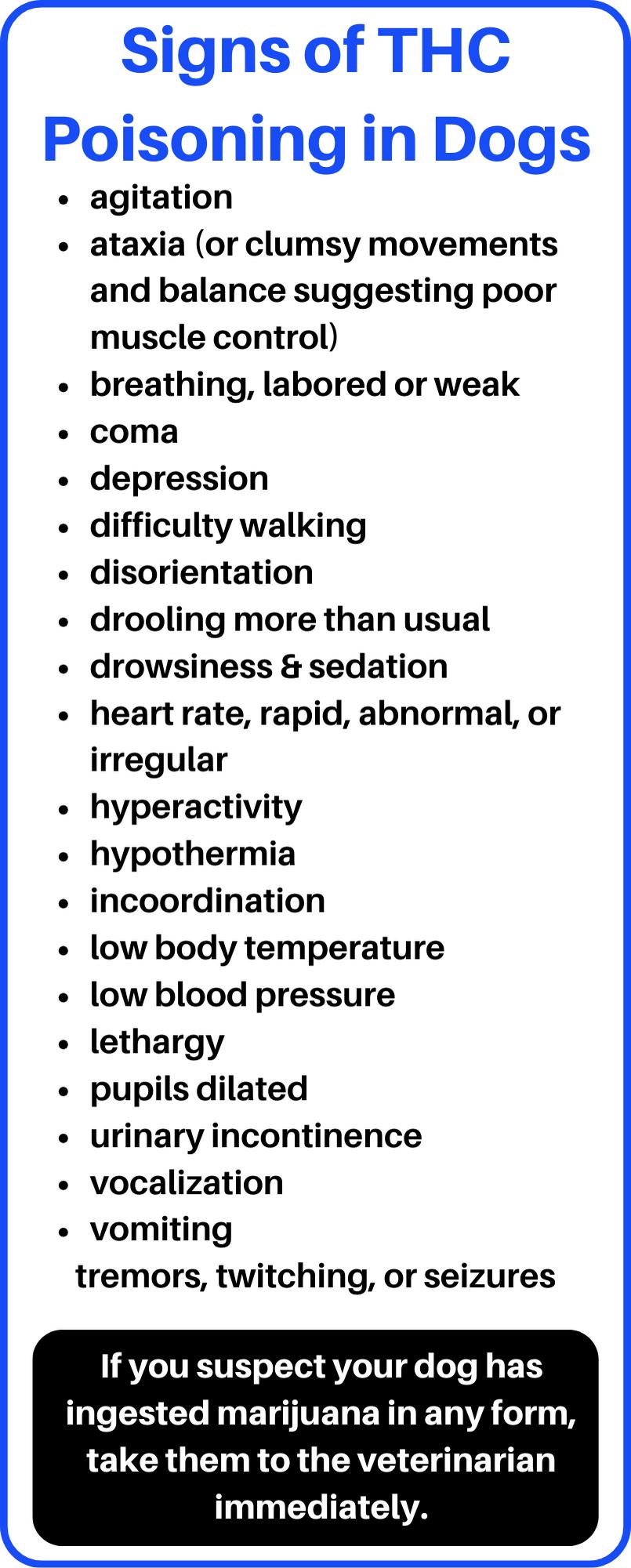
Case 3 – An individual in the marijuana industry was processing marijuana for a product he was making to sell. The waste from the process was disposed of in a compost pile where his dog found it, consumed some, and exhibited signs of severe toxicity. Despite the work of the dog's veterinarian, the dog did not survive.
Please be aware of the symptoms your pet could exhibit if it ingests nicotine or marijuana. If you have these products in your home, please ensure they are secured so that pets and children cannot get to them.
and the founder of ForceFreePets.com, an online educational resource for people with dogs
accredited by the Pet Professional Accreditation Board (PPAB)and a Bach Foundation Registered Animal Practitioner (BFRAP). Don is a member of thePet Professional Guild (PPG), where he serves on the Board of Directors and Steering Committee and chairs the Advocacy Committee. He is also a founding director of Pet Advocacy International (PIAI). In addition, Don produces and co-hosts The Woof Meow Showpodcast,available at http://bit.ly/WfMwPodcasts/,the Apple Podcast app, and Don's blog: www.words-woofs-meows.com.The opinions in this post are those of Don Hanson.
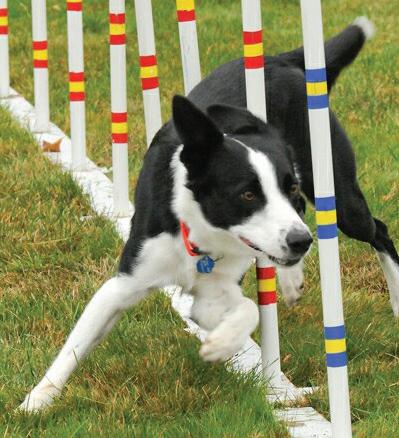
“All dogs are at risk of leptospirosis, regardless of signalment, geographic location, lifestyle, and the time of year” (ACVIM). Wherever you live, even in the Northeast United States, ask your veterinarian whether your dog should get an annual vaccination against Leptospirosis. If your veterinarian recommends a Leptospirosis shot for your dog, strongly consider vaccinating.
American College of Veterinary Internal Medicine acvim.org
Updated ACVIM consensus statement on leptospirosis in dogs.
American Veterinary Medical Association avma.org
Updated guidance on canine leptospirosis reflects better understanding of disease.
American Animal Hospital Association aaha.org
Key vaccination considerations: Leptospirosis

 By Susan Spisak
By Susan Spisak
Happy 50th Anniversary to PAWS Animal Adoption Center, aka PAWS!
PAWS is a Camden-based nonprofit that proudly serves the Midcoast communities. This milestone of animal rescue is significant, and they’ll still rely on their core values of compassion, advocacy, respect, education, and support while moving forward. Their vision is and will continue to be a humane world for every animal.
This no-kill shelter provides a safe, caring environment for animals who come to them as strays or owner relinquishments. In their 50 years, they’ve rescued, rehomed, and cared for countless pets. In 2023 alone, they rehomed 434 dogs and cats, microchipped 738, and reunited 72 pets with their families. PAWS
Trip Home in Georgia. Shelly Butler, MBA and Executive Director of PAWS said that in 2023, they rescued 77 at-risk pets from this southern effort. The PAWS staff then works hard to get them, and all their pets, paired properly and adopted quickly.
A welcome service that is now in-house and has been well-received is the PAWS Cares Community Veterinary Clinic. “Since opening the PAWS Cares Community Veterinary Clinic to the public, we have provided care to 1,000+ pet owners from the community. Additionally, we have helped more than 5,000 pets through our programs and services in 2023,” said Shelly.
She added that the clinic is open to anyone in need of veterinary care even if they struggle to afford the cost of care. This supports the staffers’
but they’re there to help families and their companion animals. “We offer routine and non-emergency care to cats, dogs, rabbits, and gerbils. We also offer spay/neuter, dental care, lumps and bumps testing, and removal as well as necessary testing and diagnostics,” explained Shelly. Additionally, CareCredit and Scratch pay are coming soon, both helpful to budget costs while keeping pets vetted and cared for. (PAWS Cares Community Veterinary Clinic, 207-236-7590.)
PAWS offers a “Safe Place for Maine.” Keeping pets and families together is their top priority, so there’s many supportive services for pet owners including short-term boarding and long-term foster for clients of partner organizations such as Knox County Homeless Coalition, New Hope Midcoast (formerly, New Hope for Women), Penbay & Waldo County
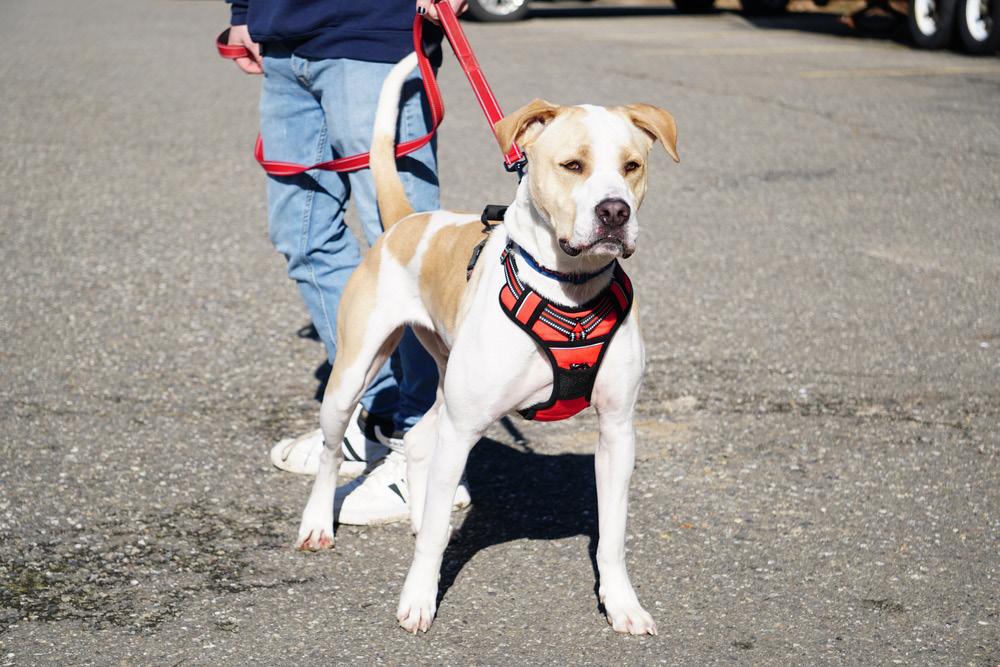
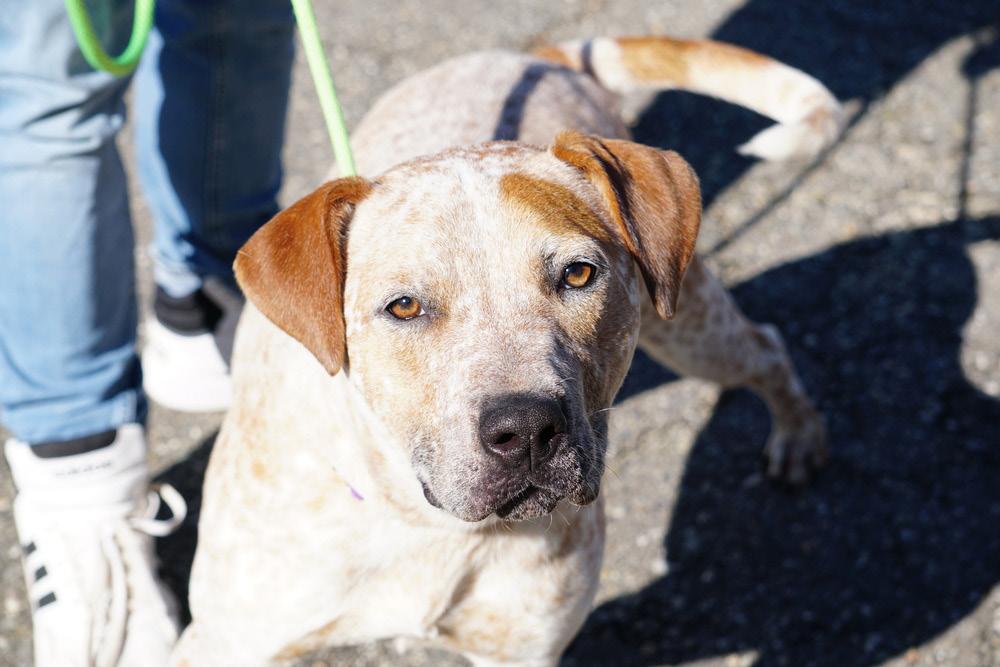
He is as delightful as they come. His personality is a blend of sweetness, friendliness, and a touch of goofiness. He's intelligent, loyal, and loves nothing more than cuddling up with his human friends. He is working on his reactivity towards other dogs and would thrive best as the only dog in the home. He's a loyal companion, ready to bring joy, love and laughter to any home.
A
and incredibly goofy pup with
abundance of energy. He's always ready for a game of fetch or a fun-filled adventure in the park. Gump is also very intelligent, mastering tricks and commands with ease. His high energy level makes him a perfect companion for those who enjoy an active lifestyle. His love for play and his friendly disposition makes him a wonderful pet for families with children.
Meals on Wheels. They also have a Pet Food Pantry—see their website link below for the app.
PAWS is celebrating their 50th Anniversary on July 25th at the beautiful Cellardoor Winery. They’re looking forward to it and proclaim this, “The Golden Paw Gala will celebrate not only the last 50 years of animal rescue, but will open the next chapter as we seek to be a resource to the entire community.” Check the website for details at pawscares.org/50thanniversary.
Save Sunday Sept. 8th for their 19th Annual Wienerfest at Steamboat Landing. Watch their website for all the dates for many fun events. For info on PAWS, including adopting, donating, and much needed fosters and volunteers, visit pawscares.org/.
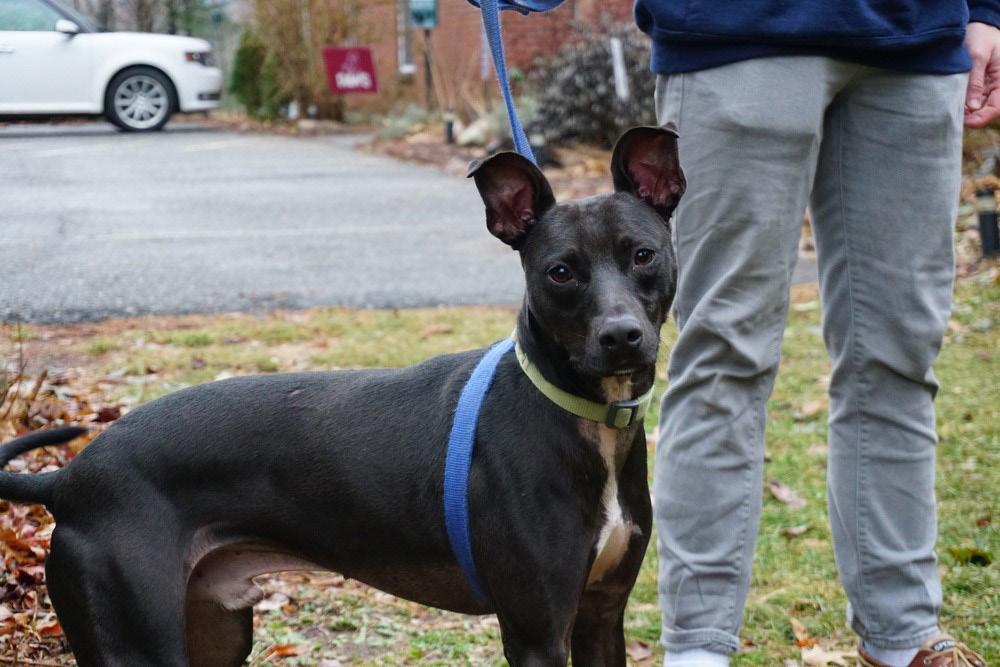
Nike has a knack for mischief and a love for other dogs. This young pup is all about the funnies, with a playful spirit that's hard to resist. This sweet, goofy, smart, friendly, energetic, and curious dog is now ready for a new adventure. His sense of humor and boundless energy are sure to brighten any home. If you're looking for a partner in crime and a best friend, Nike is your guy!
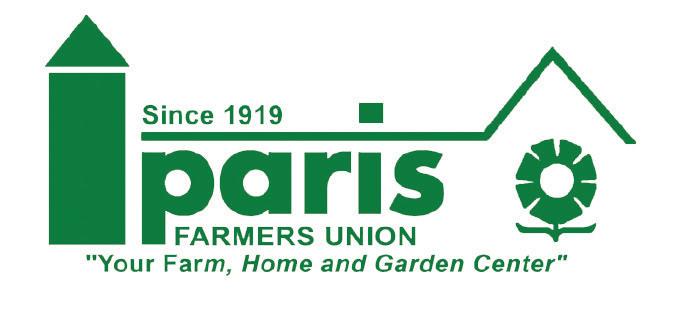













TONKA
2 years old, Great Dane
Searching for a family familiar with the breed. Weighing in at 115+ lbs, he needs space to walk, run, and nap! Tonka loves playing with other dogs and may even enjoy being in the company of a dog-savvy cat.
FMI: popehumane.org
Sponsored by: 2456 Atlantic Hwy., Lincolnville, (207)706-7908, greentreecoffee.com
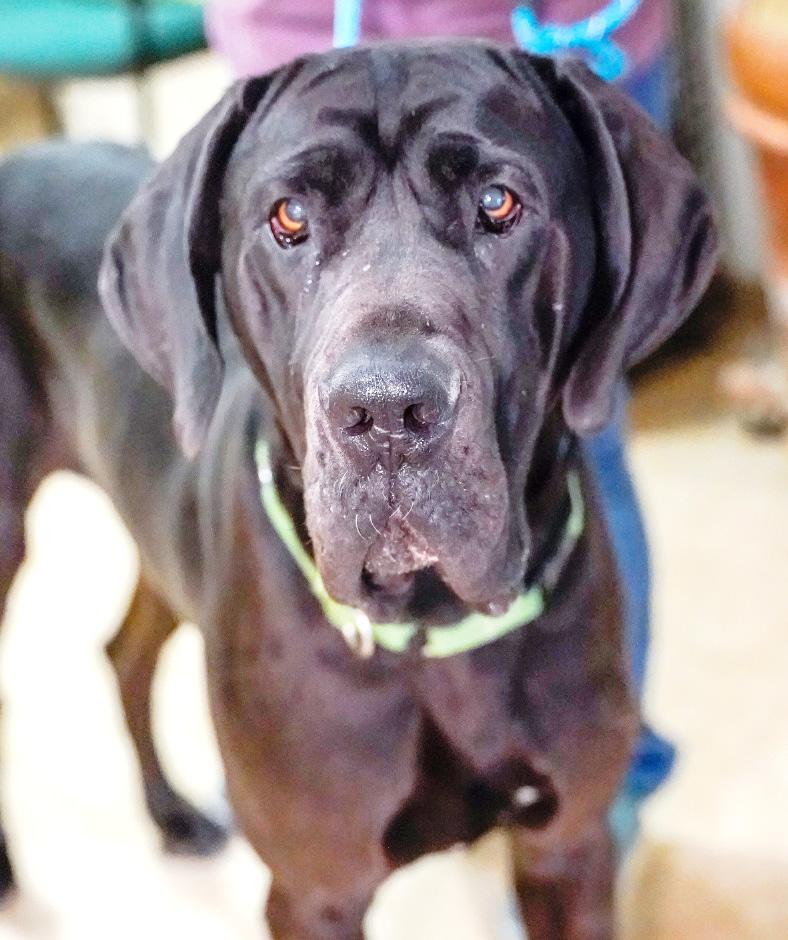
3 years old, Shepherd Mix
Katana has become a staff favorite at PMHS. While it can take a little bit for her to warm up to new people, once she does, she turns into the biggest cuddle bug who loves a good walk. A farm would be wonderful! If not a farm, then a home with plenty of space. Older dog-savvy kids should be ok.
FMI: popehumane.org

Sponsored by: Water Bark Wellness 4 Commercial St., Rockport, (207)230-8455, waterbarkwellness.com
7 year old, Mixed Breed Sister- brother- pair are looking for their forever home together. Sweet and affectionate lovebugs, they love to adventure and adore attention. Good on leashes and don’t mind seeing canine friends out and about but would prefer to not share their home with animals. Kiddos 14+.
FMI:


Sponsored by: Mason’s Brewing Company 15 Hardy St., Brewer, (207)989-6300, masonsbrewingcompany.com
BROWNIE
1 year old, Catahoula Mix
Brownie was a stray puppy that is very lovable, playful and loyal. He is extremely playful with the other dogs and cats. He would do best without senior animals as he is extremely playful and as for cats when they tell him they don’t want to play – he listens! He is super curious and is a fun loving fella!
FMI:
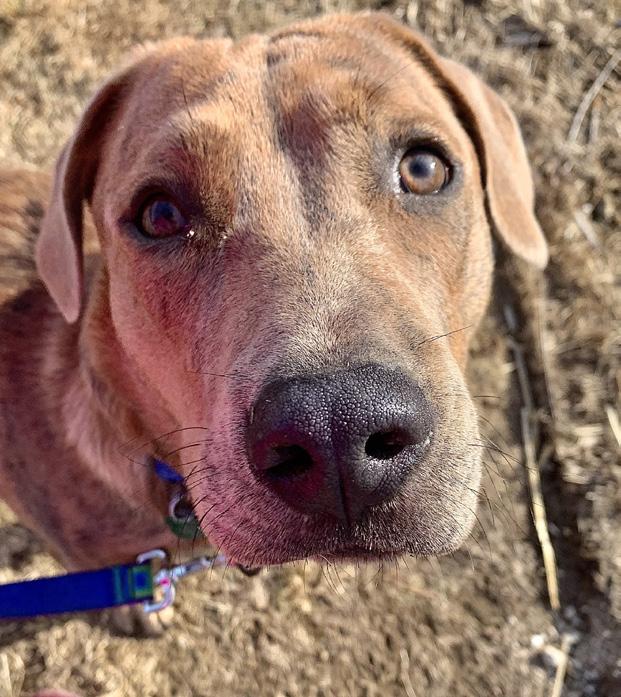
2 years old, Shepherd Mix
Kali is simply an amazing dog, so smart and eager to please! She sits and shakes on command, is house and crate trained too. She is also good with other dogs with Slow and proper introductions. She is a laid back girl who does excellent on a leash, who just wants her forever family to hang out with!
FMI: blessedbethebullies.com
ATHENA
6 years old, Shepherd/Boxer Mix
Look at those big brown puppy dog eyes. Athena, the snow-loving pup (she’s looking forward to next winter), is looking for a home where she can be your one and only. Honestly, she’s not a fan of other animals, but she adores people. She’s playful, intelligent, and ready to keep you company.
FMI: popehumane.org

FMI: olddogsnewdigs.com
Sponsored by: York Bark & Play 915 US Route 1, York, (207)361-4758, yorkbarkandplay.com
1 year old, Catahoula Leopard Hound Mix
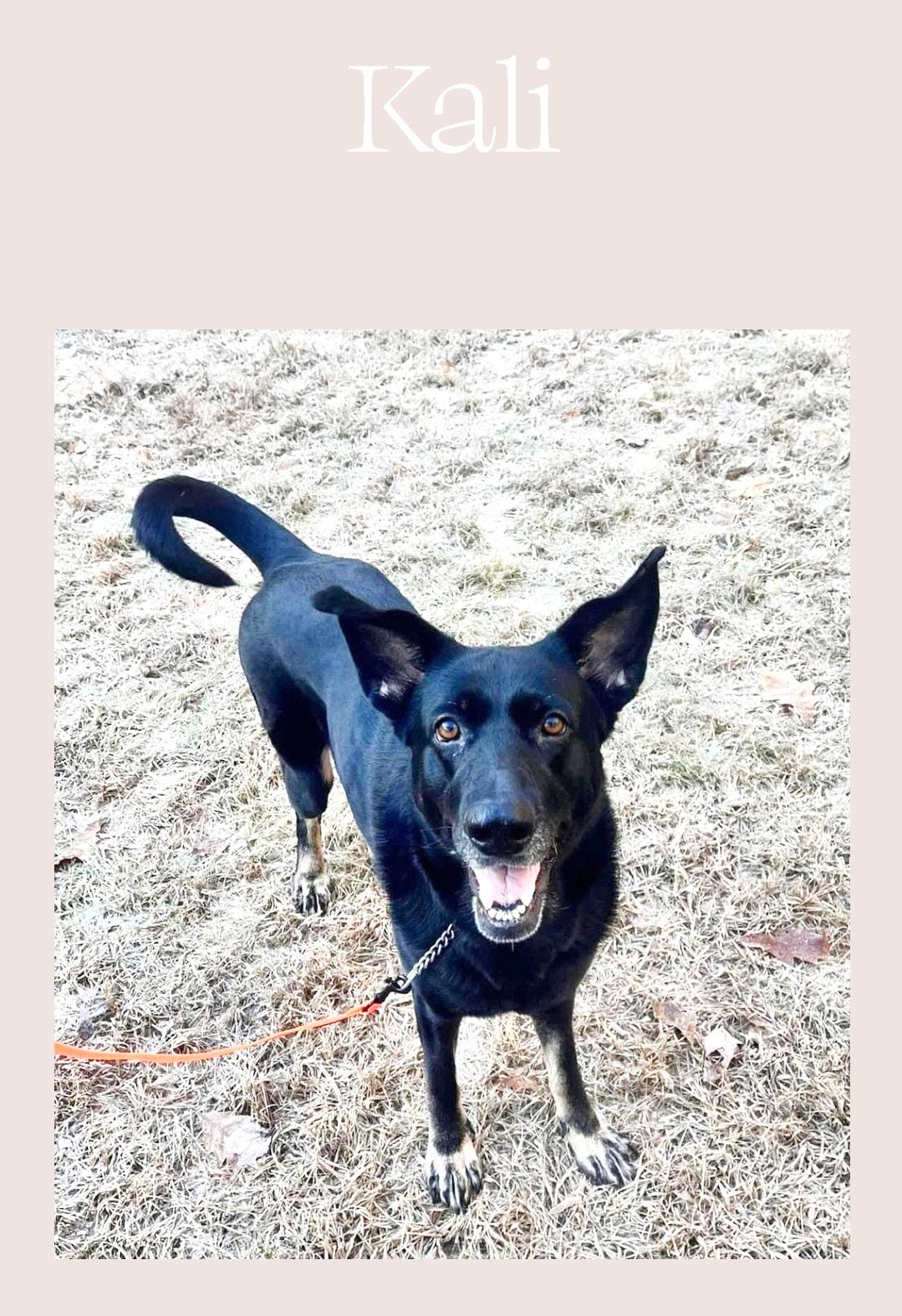
The sweetest girl, she will be your absolute best friend, always by your side. Amber is very food motivated and she will lure you in for more treats with her puppy dog eyes. She loves to play with other dogs and is good with kids 7+ due to her excitement and jumping.
FMI: Email: sln2310@yahoo.com
Sponsored by: (207)729-4678, androscogginanimalhospital.com
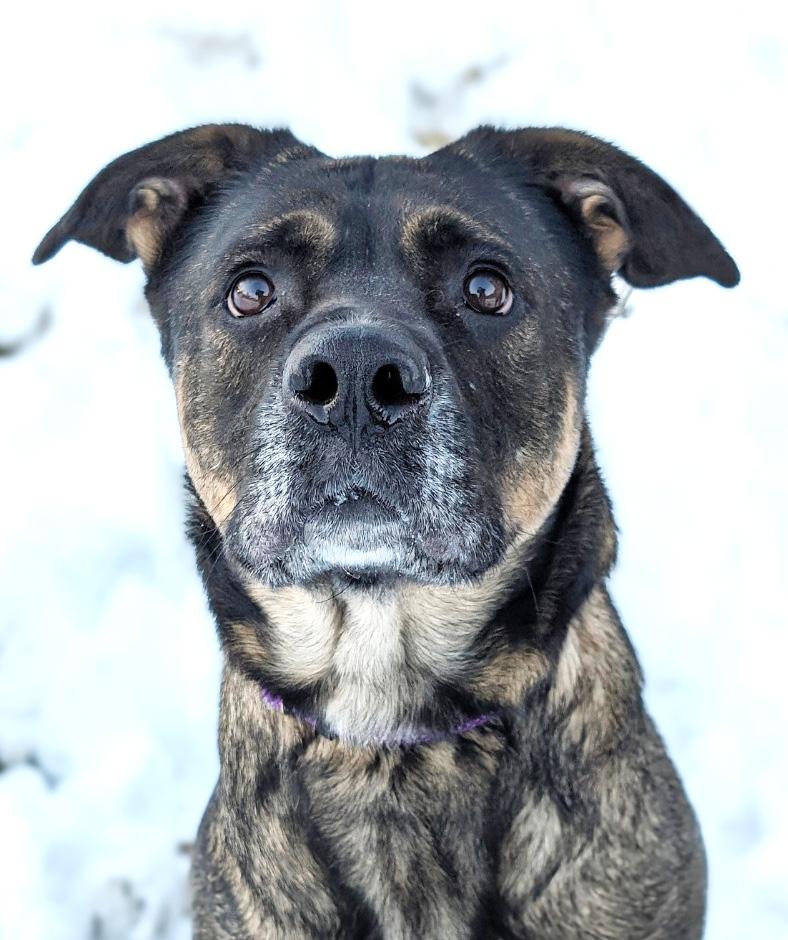
Sponsored by: First National Bank 18 Branches from Wiscasset to Calais,
15 years old, Jack Russell Mix
Dexter loves his person & wants to be near at all times, preferably touching! Doing well with the bigger dogs & cats in his foster home. He greets dogs & people with polite curiosity. Dexter has a seizure disorder which is very well controlled with 2 meds that cost about $20 per mo. Loves walking & hiking.
FMI: olddogsnewdigs.com
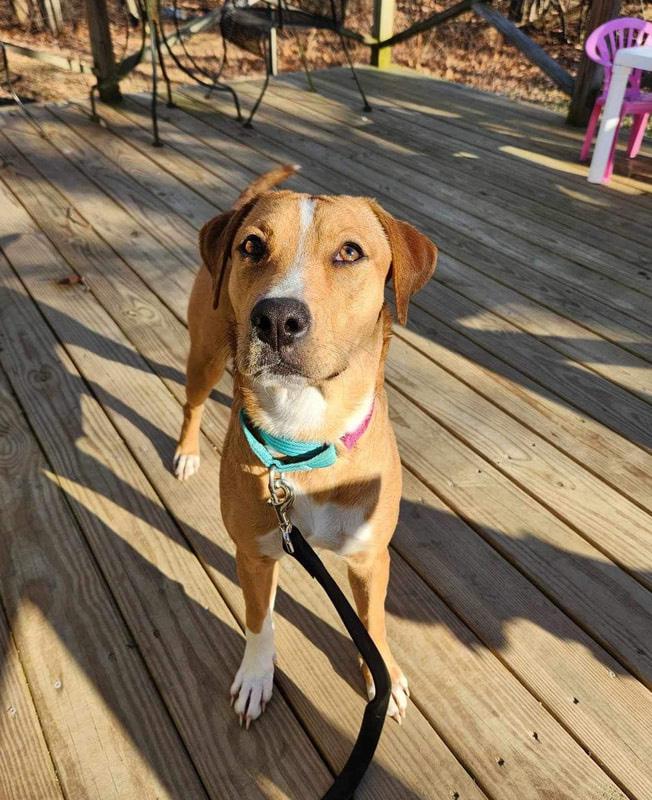
He is active and playful he knows commands sit, etc he is still a mouthy puppy but we love him. Cali is good with other dogs with slow and proper introductions. He is doing great in his foster home not having accidents in the house and he’s crate
FMI: blessedbethebullies.com
Sponsored by: (207)322-5111, kompletelyk9.com

This dude loves nothing more than fun, playing, and socializing with people and other dogs! He’s as smart as a whip and picks up on stuff very quickly! Rooney wouldn’t mind meeting future dog siblings or sharing a home with cats but he will chase! As for kids, Rough and tumble kids would be best.

FMI: pethavenlane.org
2-3 years old, Mixed Breed
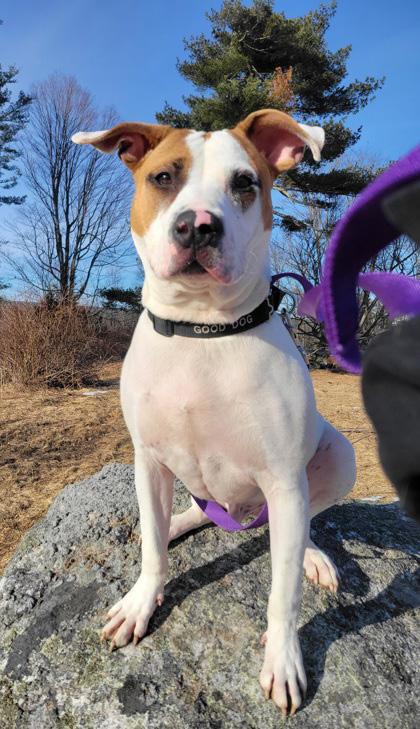
She is the sweetest, kindest, loving pup. Currently in foster this sweet girl would love to find her forever home. She loves being outdoors playing with other pups, and loves to snuggle up on the bed even more. House trained and crated trained. Great with kids, dogs, but DOES NOT like cats.
FMI: blessedbethebullies.com

TSC NAIL TRIM CLINIC
Saturday, April 6
Thomaston, 12PM – 3PM
Is your pet in need of a pedicure?
Bring them over to Tractor Supply in Thomaston and Shannon Nachajko, Director of Catahoula Rescue of New England will be on hand to make your fur kids look their very best!
And remember we trim not only dogs, but cats, rabbits, guinea pigs, you name it! Nail Trimming and Ear Cleanings are available for a $10.00 each or combo price of $12.00 for ear cleanings. All funds raised go directly to rescue. Weather permittingCall ahead in case of snow!
VST WORKSHOP
Saturday/Sunday, April 13 – 14
Augusta
Variable Surface Tracking (VST)
Workshop, Augusta, Maine. Taught by AKC Judge Carolyn Fuhrer. 2 days of comprehensive training for those seriously committed to tracking with their dogs. Auditing spots still available (working spots are full). FMI on auditing this workshop, contact Kathy at (207)691-2332 or e-mail kduhnoski@myfairpoint.net.
TSC NAIL TRIM CLINIC
Tuesday, April 16
Thomaston, 11AM – 1PM
Is your pet in need of a pedicure?
Bring them over to Tractor Supply in Thomaston and Shannon Nachajko, Director of Catahoula Rescue of New England will be on hand to make your fur kids look their very best! And remember we trim not only dogs, but cats, rabbits, guinea pigs, you name it! Nail Trimming and Ear Cleanings are available for a $10.00 each or combo price of $12.00 for ear cleanings. All funds raised go directly to rescue. Weather permittingCall ahead in case of snow!

These events are currently scheduled as of our production date however please check with the event organizers to ensure they are still taking place on these dates.

Online
April 14th - 19th
No Bowl Empty 2 Pet Food Pantry will be hosting an Online Auction April 14th through April 19th and we need auction item donations! Local business, big businesses, small business, individuals, families this is your chance to support a local nonprofit, donations of gift cards, gift baskets, experiences, services, items - anything (almost...we have to keep it legal) & everything is greatly appreciated. The more items we have the more fun the auction is, the more fun the auction is the more we raise to feed pets in need in York & Cumberland Counties. Contact Nadine at No Bowl Empty 2 at (207)2332793 or via email at nobowlempty@ outlook.com. Currently No Bowl Empty is feeding just over 2,200 dogs, cats, gerbils, hamsters, guinea pigs, rabbits, ferrets, beta fish, bearded dragons, conures, cockatiels, & parakeets.
https://www.facebook.com/NBE2PFP
Friday, April 19
Portland, 6PM
Bring your dog to a Sea Dogs game 6PM – start the game with a parade around the ball field led by Slugger, then enjoy the game in the leftfield grandstand. Tickets are available at seadogs.com, or by calling 207-8799500. Only 300 tickets available. www.milb.com
Sunday, April 21
Augusta
On Track Agility Club of Maine – AKC VST (Variable Surface) Tracking Test – headquarters: Viles Arboretum, Hospital Street, Augusta. The AKC VST test is for handlers and dogs working to achieve the coveted VST Title. If you are interested in tracking, come out and watch as the teams track human scent over vegetated and nonvegetated surfaces – a difficult and challenging test. FMI – call Kathy at (207)691-2332 or e-mail kduhnoski@ myfairpoint.net.
TSC NAIL TRIM CLINIC
Sunday, April 21
Thomaston, 12PM – 2PM
Is your pet in need of a pedicure?
Bring them over to Tractor Supply in Thomaston and Shannon Nachajko, Director of Catahoula Rescue of New England will be on hand to make your fur kids look their very best! And remember we trim not only dogs, but cats, rabbits, guinea pigs, you name it! Nail Trimming and Ear Cleanings are available for a $10.00 each or combo price of $12.00 for ear cleanings. All funds raised go directly to rescue. Weather permittingCall ahead in case of snow!
INTRODUCTION TO FETCH
Saturday, April 27
Somerville, 9AM - Noon
Practice for the new AKC FETCH
Test! Hosted by On Track Agility Club of Maine. Morning workshop from 9am until Noon at North Star Dog Training School, Somerville, ME. AKC FETCH judges will be presenting the workshop. FMI: Kathy (207)691-2332 or email kduhnoski@myfairpoint.net. $50 (OTAC MEMBERS $35)
THE 2024 DASH FOR DOGS 5K
Sunday, April 28th
Lewiston, 9AM – 12PM
A popular, yearly event held right at the GAHS on Strawberry Ave in Lewiston! Come walk or run the course along the beautiful Androscoggin Riverwalk path. This is one of the few events in Maine that allow you to also bring your dog (must be current on vaccinations and NO flex-lead leashes). There is also an option to participate virtually. An opportunity to kick off spring by getting outside with our canine friends, while raising funds to help needy canines in the shelter! FMI: https://gahumane.org/dashfordogs/



























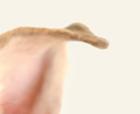





















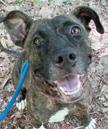












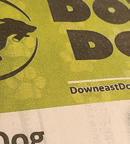


















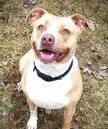





This pantry has been serving the Waldo County pet community since 2013. And each time we have been in a crunch, the community has come forward and gave us all the support they could! Folks have donated food and supplies, volunteered, advertised, shared on social media, you name it! This community GIVES!
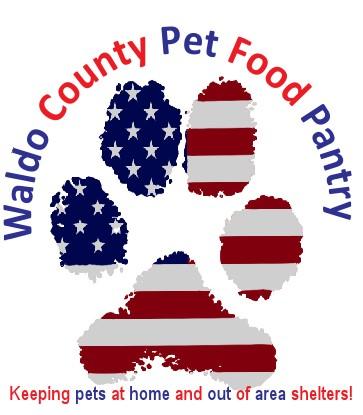
Now with the rising costs of well, everything we are finding ourselves in uncertain times! We survived the Covid pandemic, we have survived the ongoing rising costs, we have survived the need of our services getting greater. We are spending almost $2,000 monthly just to stay afloat and keep area pets healthy and well fed! The majority of our funds go directly to pet food purchases, we simply cannot continue without a real long-term plan/goal and of course, funding! We provide twice monthly pet food/supply distribution dates, Home Delivery for Veterans and elderly, 2 rabies clinics a year, we offer quality flea/tick prevention, treats, toys, bedding and we have a spay/neuter program! We are a much-needed resource for pet owners, and the need is only growing! There are numerous pet food pantries throughout Maine who are all facing the same struggle.
We have recently made changes to our social media Facebook page and are asking everyone and their friends, family to become subscribers to us!!!! It’s just 99 cents a month! And, if they send us their email address, we will add them to our online monthly newsletter, which is filled with the goings on at the pet food pantry and other useful pet information.
We also have Paypal giving fund, Venmo and Facebook pay for tax deductible donations. We are a 501c3 with the IRS and are tax #Exempt with the State of Maine. Checks can be mailed to our location at 34 Field Street Belfast, Maine 04915.
Please call or email! I would love to set up a time to chat and let those without social media know about us! (207)322-3237; waldocountypetfoodpantry@yahoo.com







